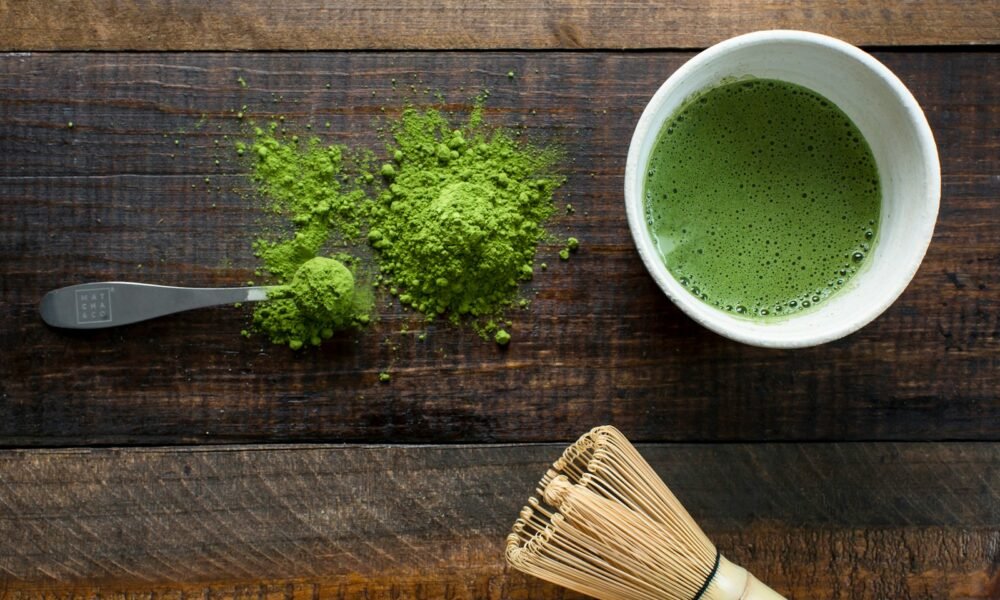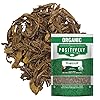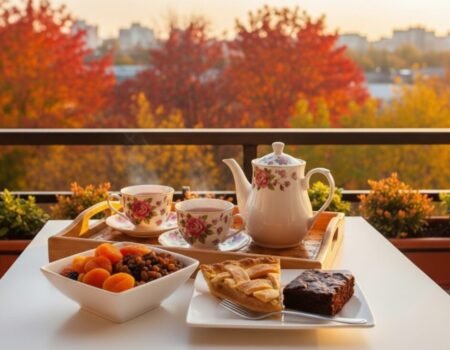Index
Green tea ranks among the world’s oldest drinks, dating back 5,000 years to ancient China. This guide breaks down every major green tea variety, from everyday sencha to premium matcha powder.
You’ll discover how each type tastes, their unique health benefits, and simple brewing tips for perfect cups every time.
Key Takeaways
- Green tea varieties reflect their regional processing methods: Japanese producers typically steam their leaves (creating teas like sencha and matcha), while Chinese tea makers often pan-fire theirs (producing varieties like Longjing). Korean, Vietnamese, and other regional styles add further diversity to this ancient beverage family.
- Processing methods create distinct flavors – Japanese teas taste grassy and bright, while Chinese teas offer nutty, toasty notes.
- Shade-grown varieties like gyokuro and matcha contain more L-theanine, which provides focused energy without jitters.
- Sencha makes up 80% of Japanese tea production, while premium gyokuro requires at least 20 days of shade before harvest.
- Green tea history spans 5,000 years, with regional specialties developing unique characteristics based on local growing conditions and processing techniques.
Green Tea Basics
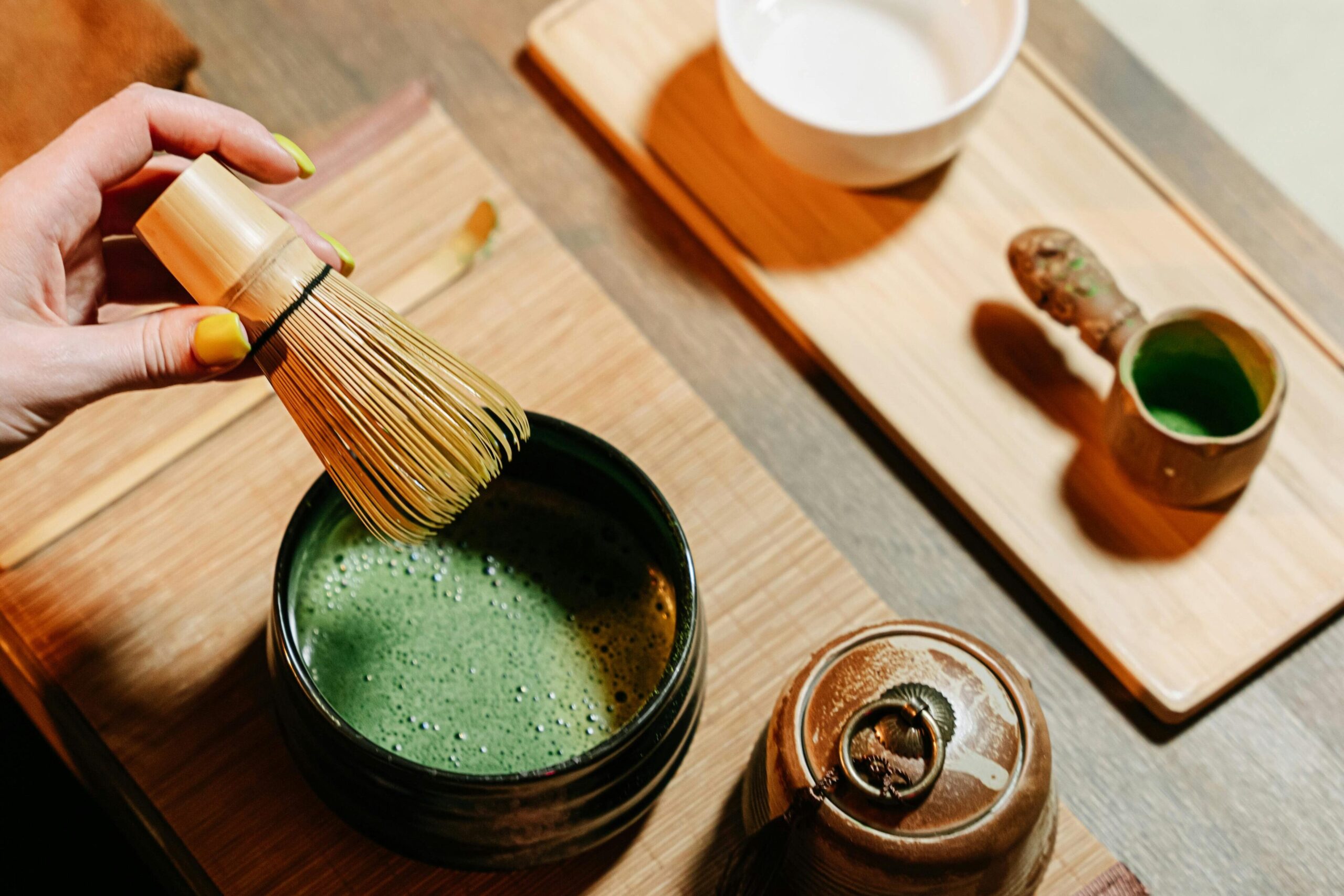
Green tea stands apart from other teas thanks to its minimal oxidation and fresh processing methods. The leaves keep their bright green color because farmers steam or pan-fire them right after picking, which locks in their natural flavors and health benefits.
Understanding What Makes Tea “Green”
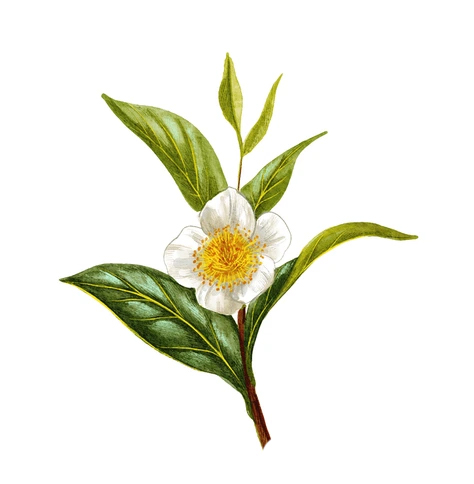
Tea earns its “green” title through specific processing methods that preserve its natural state. Unlike black or oolong varieties, tea farmers harvest Camellia sinensis leaves and quickly heat them to stop oxidation.
This crucial step locks in the leaf’s chlorophyll, creating that vibrant green color you see in your cup.
Japanese producers typically steam their tea leaves, which maintains high levels of chlorophyll and amino acids. This method gives Japanese green teas their fresh, grassy flavors and bright appearance.
Chinese tea makers often prefer pan-firing or roasting techniques instead. These methods create different flavor profiles with nutty or toasty notes while still keeping the essential “green” characteristics intact.
The preservation of chlorophyll not only contributes to the tea’s color but also helps retain many of the plant compounds linked to health benefits.
Green Tea’s Place in the Tea World
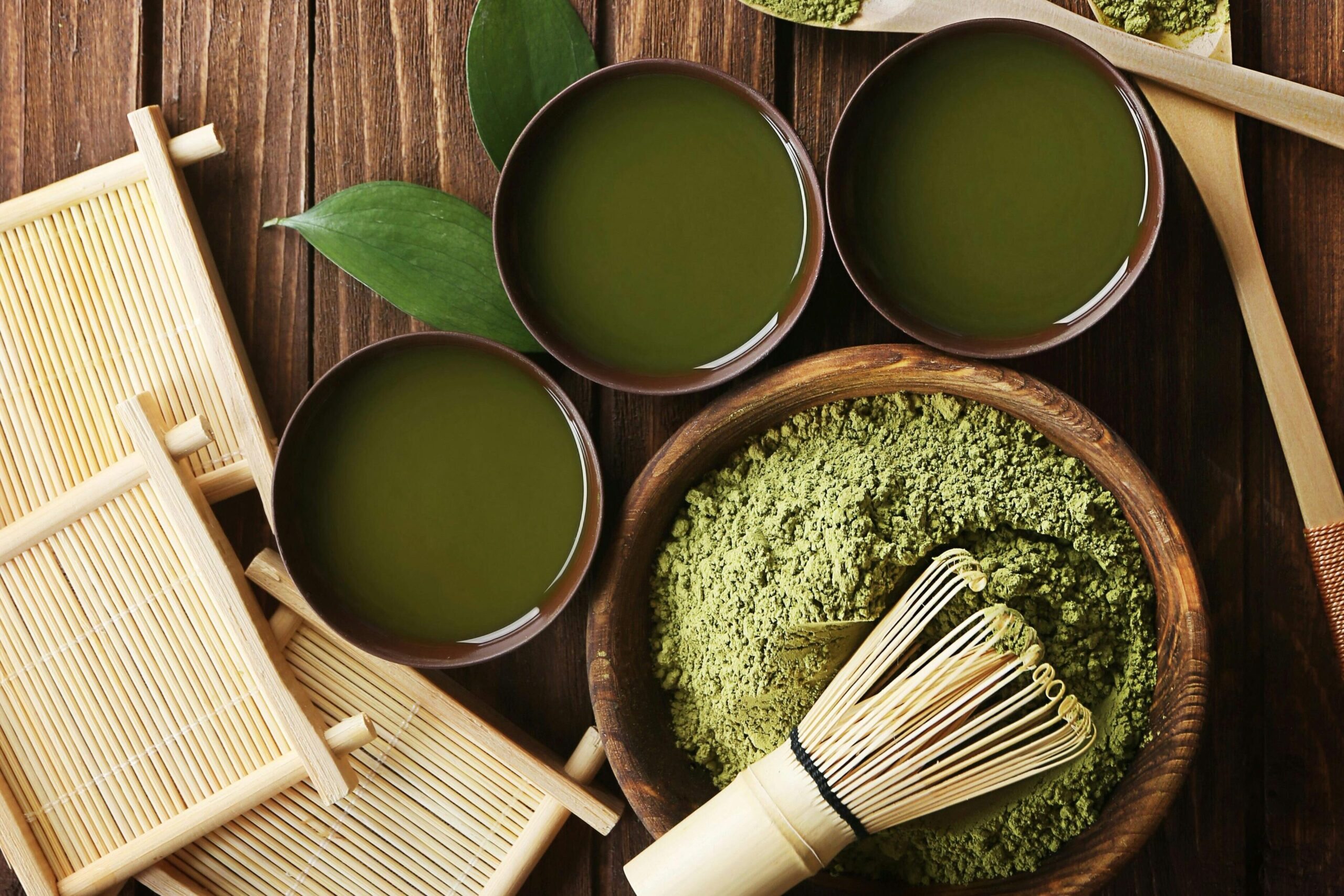
Green tea stands as one of the six main tea types alongside black, oolong, white, yellow, and dark teas. Unlike black tea which undergoes full oxidation, green tea skips this process entirely.
Tea makers halt oxidation through heat application—either steaming (Japanese style) or pan-firing (Chinese method). This minimal processing preserves green tea’s natural compounds and creates its signature vegetal flavor and vibrant green color.
The global tea market values green tea for its rich antioxidant content, particularly catechins and polyphenols. These compounds give green tea its reputation for health benefits. China and Japan lead green tea production, each developing distinct regional styles over centuries.
Chinese varieties like Longjing (Dragon Well) offer nutty, toasted notes, while Japanese teas such as sencha deliver grassy, umami flavors that reflect their unique processing methods.
Green tea enjoys special cultural status across Asia, featuring prominently in ceremonies and daily rituals. The Japanese tea ceremony centers around matcha, while Chinese tea traditions celebrate the art of brewing loose leaf varieties.
Modern tea drinkers appreciate green tea both for its traditional importance and its adaptability to contemporary tastes through flavored blends and innovative preparations like green tea lattes.
Key Processing Methods (Steaming vs Pan-Firing)
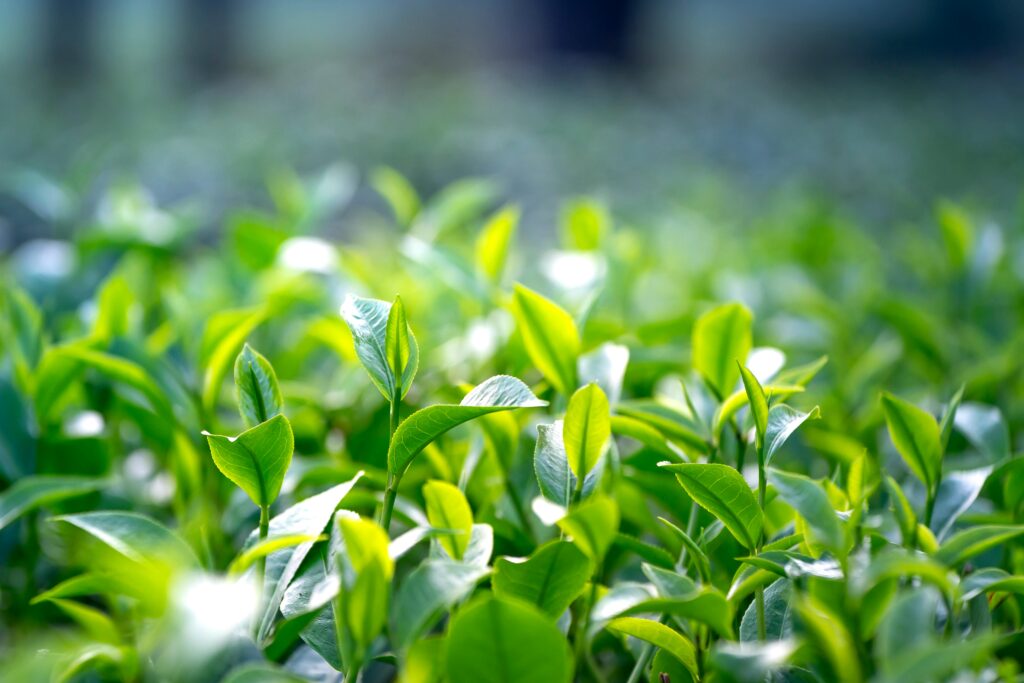
While understanding green tea’s significance in the global tea landscape provides context, the processing methods truly define what makes each variety unique. The way tea leaves transform from fresh-picked foliage to the dried product in your cup depends primarily on two key techniques.
| Processing Method | Origin | Technique | Flavor Profile | Notable Examples |
|---|---|---|---|---|
| Steaming | Primarily Japan | Tea leaves exposed to steam for about one minute to halt oxidation | Bright, vegetal, grassy notes with vibrant green color | Sencha, Gyokuro, En Shi Yu Lu (rare Chinese steamed tea) |
| Pan-Firing | Primarily China | Leaves heated in woks to approximately 150°F to stop oxidation | Toasty, nutty flavors with roasted chestnut notes | Dragonwell (Longjing), Bi Luo Chun |
| Historical Note | Ancient Chinese tea processing began with steaming methods before pan-firing became dominant | |||
These processing techniques create fundamental differences in tea character. Steamed teas maintain more fresh leaf compounds, resulting in brighter cups with vegetal intensity. Pan-fired varieties develop toasty depth through their contact with hot metal surfaces. The choice between these methods shapes everything from aroma to mouthfeel. Different regions have perfected their approach over centuries, with Japanese tea masters focusing on steam’s clean precision while Chinese artisans excel at the careful hand movements needed for perfect pan-firing results.
Artisanal Techniques and Flavor Development
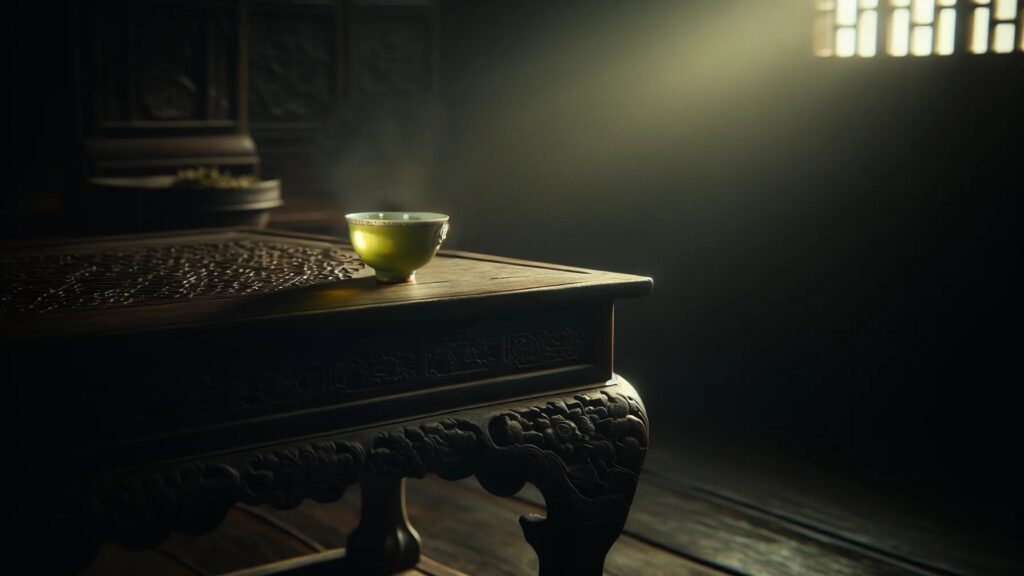
Tea masters craft green tea through careful methods that bring out unique flavors. Japanese artisans steam leaves quickly to lock in grassy notes, while Chinese experts pan-fire tea to create nutty profiles.
The shade-growing technique used for matcha creates sweet, umami flavors by boosting amino acids in the leaves. Each region adds special touches – some producers hand-roll leaves, others roast them at different temperatures.
These methods transform the same plant into drinks with vastly different tastes.
Quality matters greatly in tea production. Fresh leaves must be processed within hours of picking to preserve their bright green color and natural compounds. Traditional ceremonies like chanoyu showcase these artisanal teas, where proper whisking creates the signature frothy texture in matcha.
The processing method directly affects caffeine content, with shade-grown varieties typically containing more energy-boosting compounds. Next, we’ll explore how these techniques create distinct green tea styles around the world.
Classic Green Tea Styles
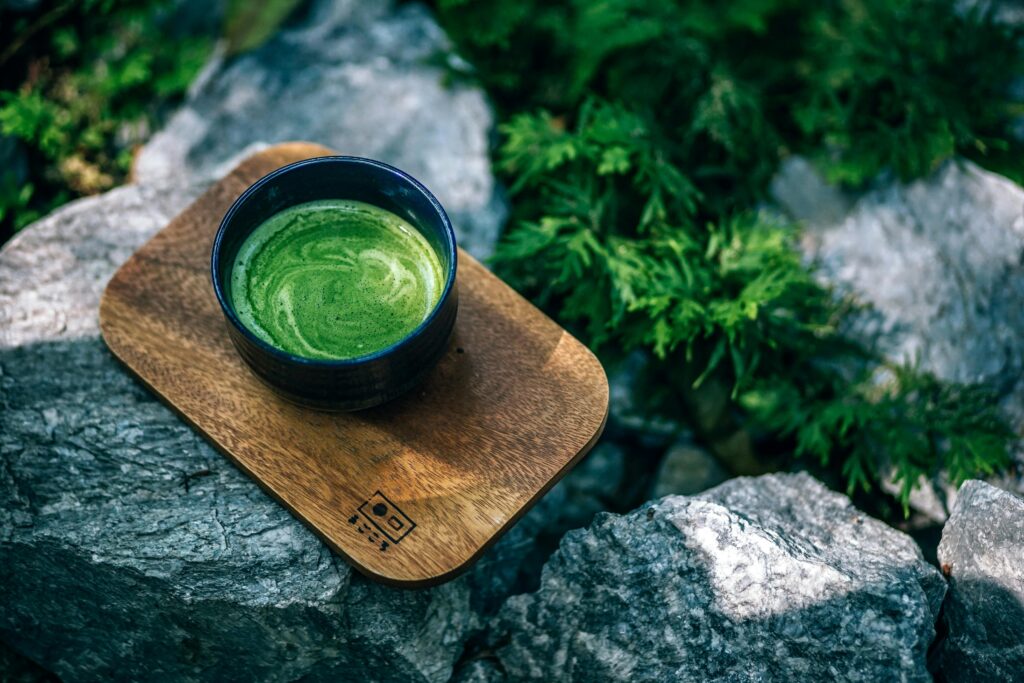
Classic green tea styles vary widely between Japanese steamed and Chinese pan-fired methods, each with distinct flavors and aromas that reflect their unique processing techniques. Discover how regional variations create the rich tapestry of green tea traditions across Asia.
Japanese Steamed Varieties
Japanese green teas stand apart from other varieties thanks to their unique steaming process. Unlike Chinese teas that use pan-firing, Japanese producers steam fresh leaves to halt oxidation.
This method locks in the bright green color and creates the vegetal, grassy flavors that tea lovers prize in Japanese green teas.
Sencha leads as Japan’s most common green tea, representing approximately 50-55% of all Japanese tea production according to recent industry data. The leaves grow in full sunlight, giving Sencha its balanced flavor profile with pleasant grassy notes.
Gyokuro represents the premium end of Japanese teas, with plants grown under shade for 3-6 weeks before harvest. This shading boosts umami flavors and L-theanine content, creating a sweeter, more complex cup with less bitterness than other green teas.
Matcha deserves special attention as a powdered green tea that users consume whole rather than steeped. Tea farmers shade the plants similar to Gyokuro, then grind the dried leaves into a fine powder using stone mills.
This process preserves both caffeine and L-theanine, creating an energizing yet focused effect many drinkers seek. For best results, steep these Japanese varieties at lower temperatures (around 160°F) to avoid drawing out bitter compounds.
Chinese pan-fired varieties offer a different approach to green tea processing with their own distinct characteristics.
Chinese Pan-Fired Varieties
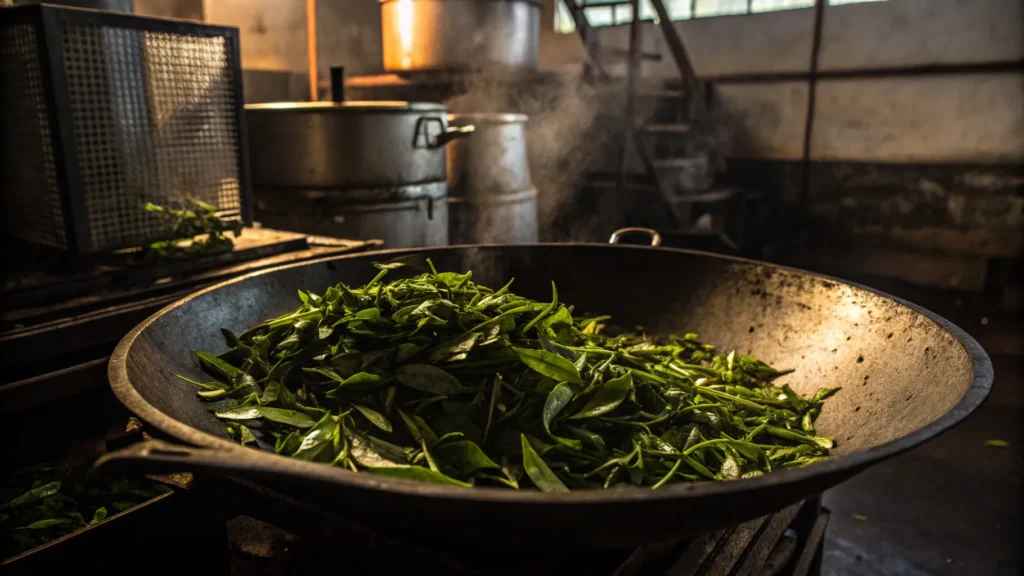
Chinese pan-fired green teas offer distinct flavors due to their unique processing method. Longjing (Dragon Well) stands as the imperial classic, famous for its flat leaves and roasted chestnut flavor that tea lovers prize.
This premium tea comes from specific regions in China and requires skilled hand movements during firing. Other notable varieties include Biluochun with its fruity, mellow taste and tightly curled leaves, making it a favorite among tea connoisseurs.
Gunpowder tea delivers a bold, smoky flavor profile that sets it apart from other green teas. The leaves are rolled into small pellets that unfurl during brewing, creating a vibrant green cup.
Pan-firing stops oxidation quickly while developing deeper flavors than steamed varieties. These Chinese teas maintain their popularity worldwide because they offer complex taste experiences without bitterness when brewed correctly at the right temperature.
Regional Processing Variations
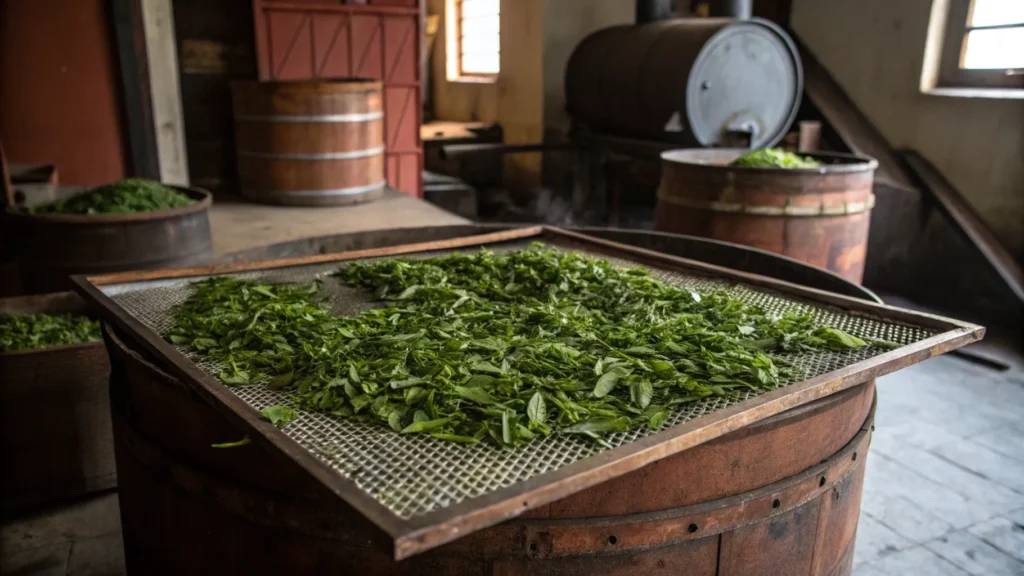
Green tea processing varies dramatically across regions, creating unique flavor profiles. In China, tea masters use pan-firing or sun-drying methods that produce nutty, toasty notes in their green teas.
Japanese producers prefer steaming, which locks in the bright, grassy flavors and creates that vibrant green color tea lovers recognize instantly. Nepal stands out with its special hand-rolling technique in Darjeeling areas, giving their green teas a distinct muscatel character.
Tea production methods directly impact both taste and health benefits. Steamed Japanese varieties like sencha and gyokuro contain higher levels of certain catechins compared to pan-fired Chinese types such as Longjing (Dragon Well).
Each regional approach represents centuries of local wisdom passed through generations of tea farmers. These differences explain why a cup of green tea from Shizuoka tastes nothing like one from Hangzhou, despite coming from the same plant species.
Green Tea Blends and Scented Teas
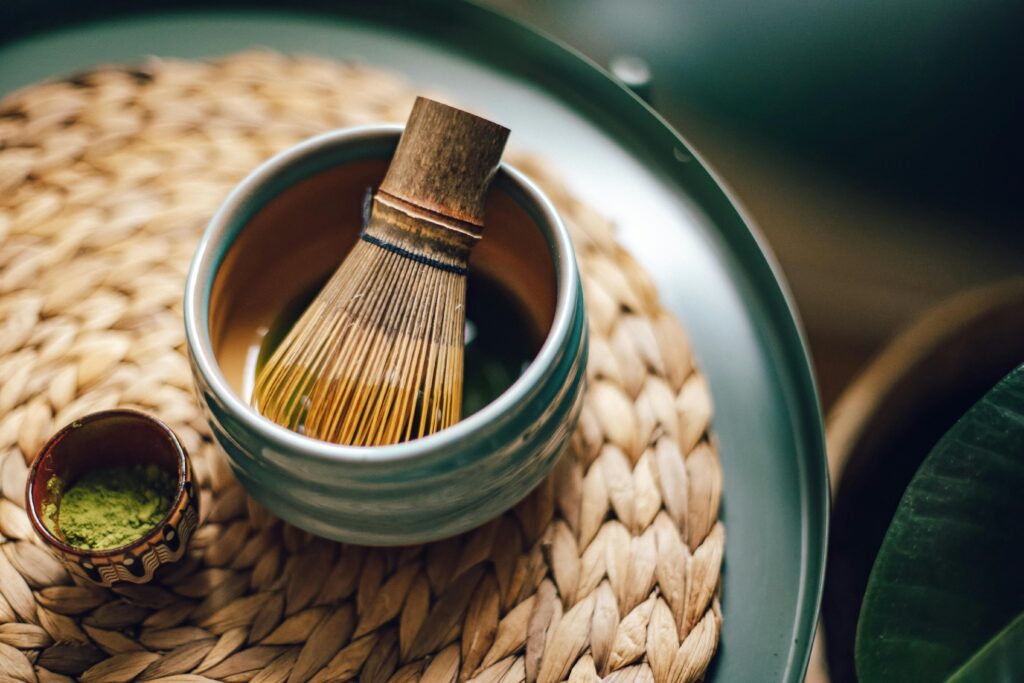
Green tea blends combine pure leaves with flowers, spices, or fruits to create new taste profiles. Jasmine tea stands as the most famous scented green tea, made by layering tea with fresh jasmine blossoms that share their sweet smell.
Traditional Scented Varieties
Scented green teas blend the fresh taste of tea leaves with natural fragrances from flowers or fruits. Jasmine green tea from Guangxi, China stands as the most famous example, created by layering tea leaves with fresh jasmine blossoms.
The tea absorbs the floral aroma during an overnight process, resulting in a sweet, fragrant cup that balances the grassy notes of green tea with jasmine’s perfume. Tea makers often repeat this scenting process several times to achieve the perfect intensity.
Other traditional scented varieties include lotus tea, which uses the same layering technique but with lotus flowers instead of jasmine. This method dates back centuries in tea-producing regions, where tea artisans discovered that certain flowers could enhance and complement the natural flavors of green tea leaves.
The scenting process adds complexity without overwhelming the tea’s original character, creating a harmonious flavor profile that appeals to both new tea drinkers and experienced connoisseurs.
Cultural Blend Traditions
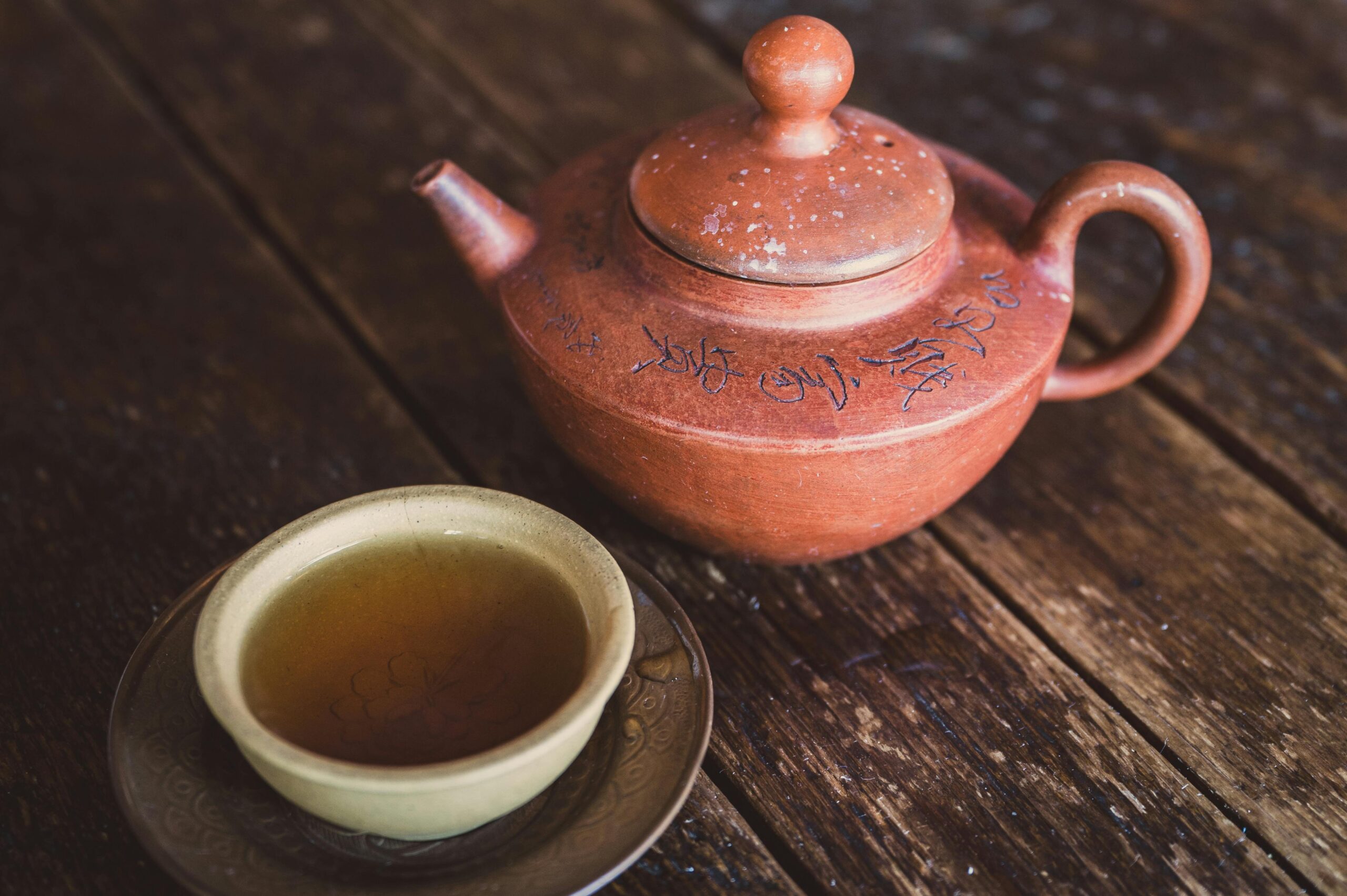
Tea blending traditions stretch back centuries across different cultures. In Morocco, people mix Gunpowder green tea with fresh mint and sugar to create their famous mint tea, which stands as a symbol of hospitality.
Guests receive this blend as a welcome gesture in homes and shops throughout North Africa. Japanese culture takes a different approach with matcha, using it in formal tea ceremonies that focus on four key principles: harmony, respect, purity, and tranquility.
Many regions develop unique green tea blends based on local ingredients and tastes. Chinese traditions often combine green tea with jasmine flowers or other fragrant plants. Korean tea culture features blends with pine nuts or jujube dates.
These cultural blends reflect each society’s values and available resources. Today’s tea lovers can explore these traditional mixtures while also trying modern flavored options that combine green tea with fruits, spices, or herbs.
Modern Flavored Green Teas
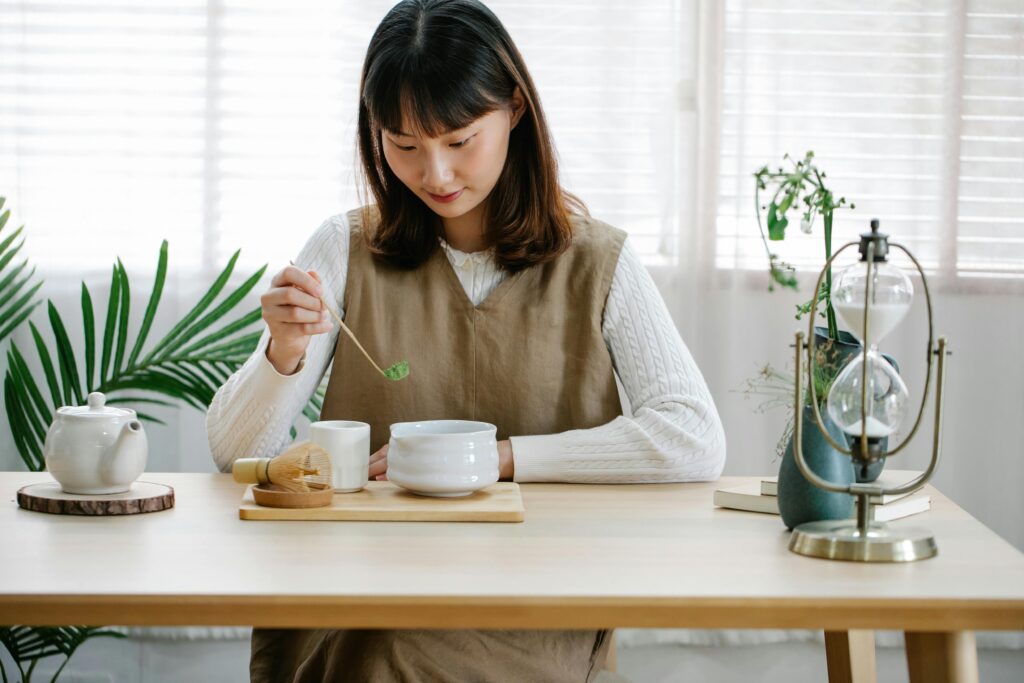
While traditional blend methods honor centuries-old practices, modern flavored green teas break new ground with bold taste combinations. These innovative blends mix green tea with fruity or floral notes that appeal to both newcomers and seasoned tea drinkers.
Popular options include citrus-infused sencha, berry-enhanced matcha, and vanilla-accented dragon well varieties that create unique flavor profiles.
Tea companies now craft specialty blends that combine quality tea leaf bases with natural flavors like peach, mango, and lavender. These modern options make green tea more accessible to people who find traditional varieties too grassy or bitter.
The growing market for these flavored teas shows how the drink continues to evolve while maintaining its place as one of the world’s most beloved beverages.
Contemporary Blending Principles
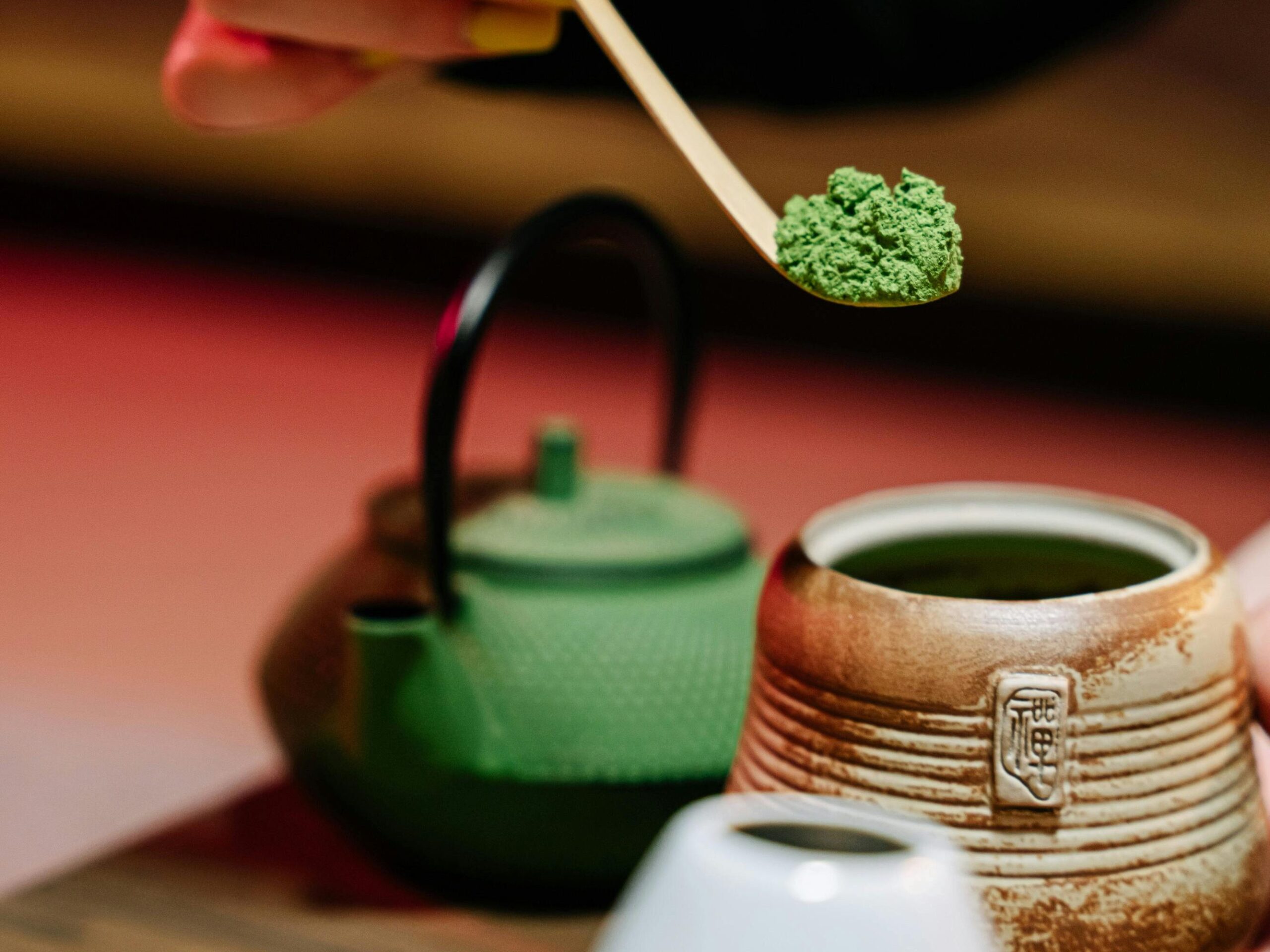
Modern flavored green teas lead naturally to today’s blending methods. Tea artists now combine green tea with specific herbs and fruits based on both taste and health goals. Most blenders focus on creating products that offer wellness benefits while still tasting great.
This approach meets growing consumer demand for functional beverages that work double-duty as both enjoyable drinks and health supplements.
Tea masters select base teas with specific flavor profiles that will complement added ingredients. A bright, grassy sencha pairs well with citrus notes, while a nutty Chinese green tea might blend better with warm spices.
Quality blenders avoid masking the natural tea character and instead enhance it through thoughtful combinations. The best green tea blends maintain a balance where you can taste both the tea’s natural qualities and the added flavors.
The artisanal tea movement has pushed blending into new territory. Small-batch producers experiment with unexpected ingredients like specific flower varieties, rare fruits, and even spice combinations from different culinary traditions.
These specialty green tea blends often tell a story through their flavor profiles, connecting drinkers to particular regions or cultural practices. Many tea shops now offer seasonal blends that showcase fresh, local ingredients at their peak flavor.
Harney & Sons Dragon Pearl Jasmine Tea (20 Count)
Traditional jasmine pearls with heavenly fragrance—convenient sachets that still unfurl beautifully.
Traditional jasmine pearls undergo multiple scenting passes with fresh jasmine blossoms—the tea absorbs the fragrance, then the spent flowers are removed and replaced. This Harney & Sons version delivers that authentic floral intensity (15 reviewers raved about the aroma) in convenient pyramid sachets that still let you watch the pearls unfurl.
⚠️ Skip this if you want bold jasmine punch that dominates your palate—this is refined and delicate, not a flavor sledgehammer.
Types of Green Tea from Japan
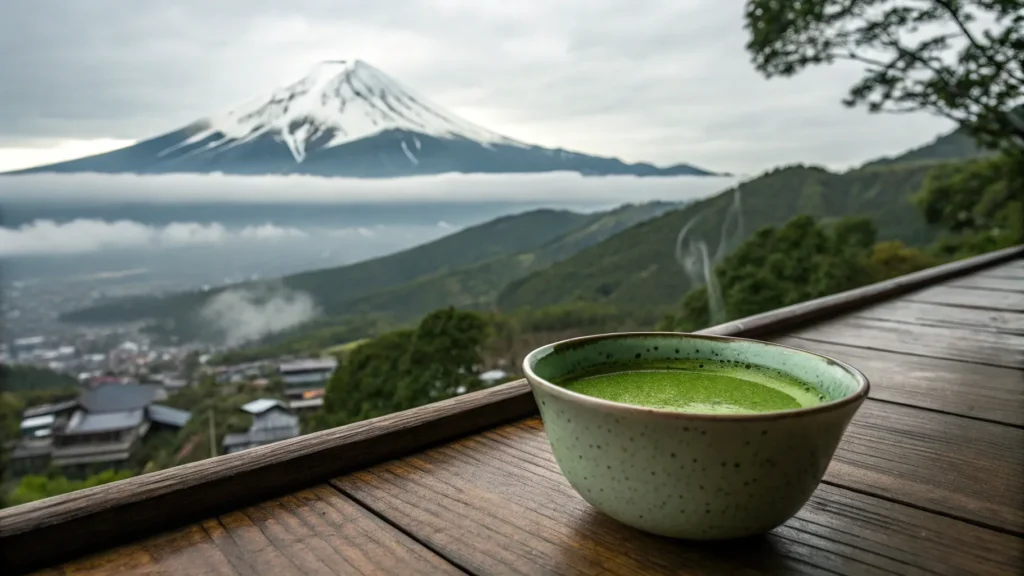
Japan offers some of the world’s most prized green teas, from everyday Sencha to rare Gyokuro grown in the shade. Learn about these distinct Japanese teas and what makes each special in our next section.
Sencha: The Standard Bearer
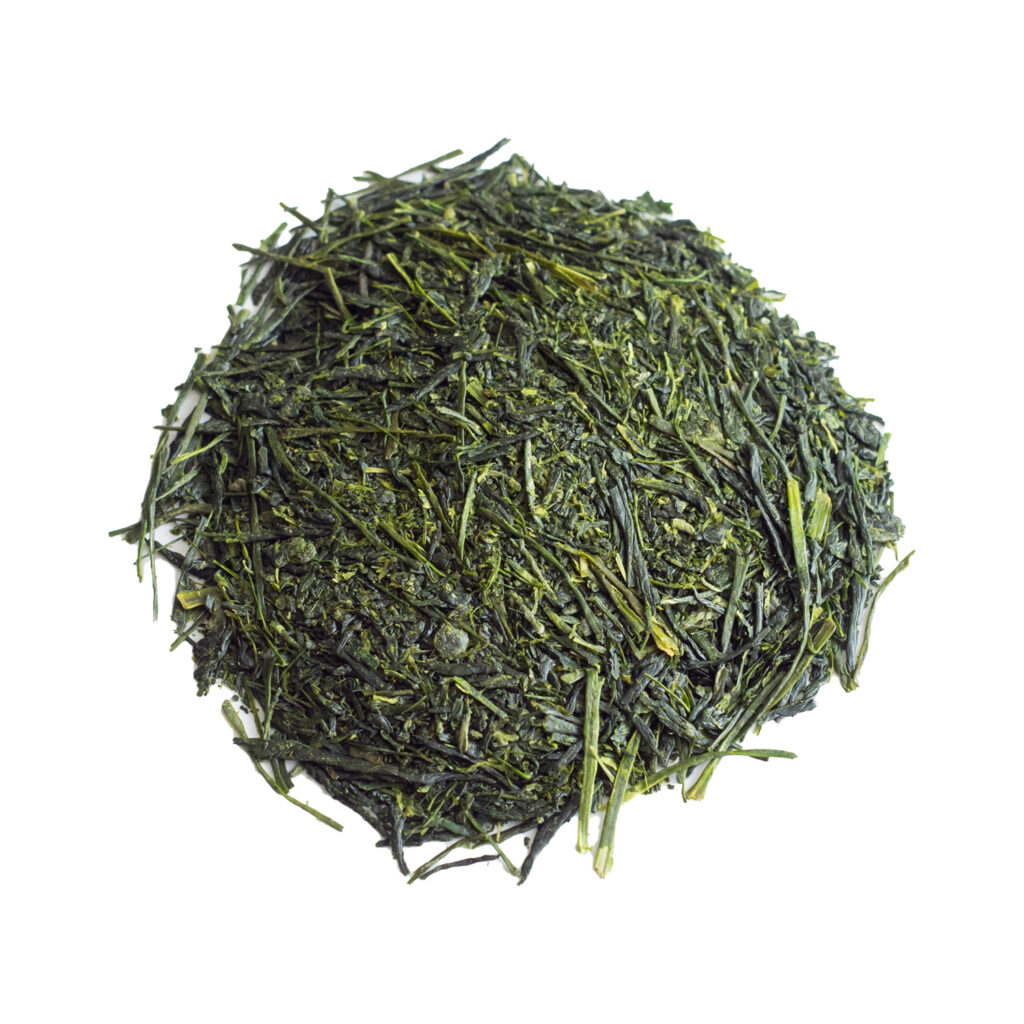
Sencha stands as Japan’s most popular green tea, accounting for just over half of the nation’s total tea production. Recent data shows this everyday favorite makes up 50-55% of Japanese tea output, maintaining its position as the country’s leading variety.
This bright green tea offers a perfect balance of nutty and fruity flavors that tea lovers enjoy daily.
Most sencha comes from Shizuoka, where farmers use special steaming methods to lock in the tea’s vibrant color and taste. The leaves undergo careful processing that stops oxidation quickly, preserving their fresh qualities.
Tea experts prize sencha for its grassy notes and slight sweetness that changes with each brewing. You can spot quality sencha by its needle-shaped leaves and emerald green color in the cup.
Different harvest times affect the flavor – spring sencha (shincha) tastes sweeter and more delicate than later harvests. Many tea drinkers start their green tea journey with sencha before exploring other varieties.
Gyokuro: The Shaded Premium
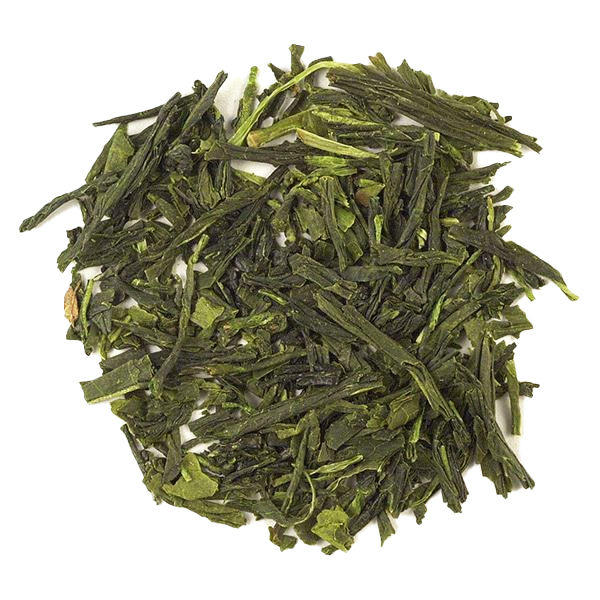
Gyokuro stands as Japan’s most prized green tea, grown under special shade cloth for at least 20 days before harvest. This unique shading process boosts chlorophyll and amino acids, creating its signature dark emerald leaves and rich umami flavor.
Tea masters prepare this luxury brew at cooler temperatures between 50-60°C (122-140°F) to preserve its delicate taste profile.
Health enthusiasts value gyokuro for its impressive benefits beyond just taste. The shade-growing method increases L-theanine content, which supports improved focus without the jittery effects of other caffeinated drinks.
Regular gyokuro consumption may also support heart health through its concentrated antioxidants and stress-reducing properties. This premium tea costs more than standard varieties but delivers exceptional quality for those seeking the finest Japanese tea experience.
Kabusecha: The Middle Path
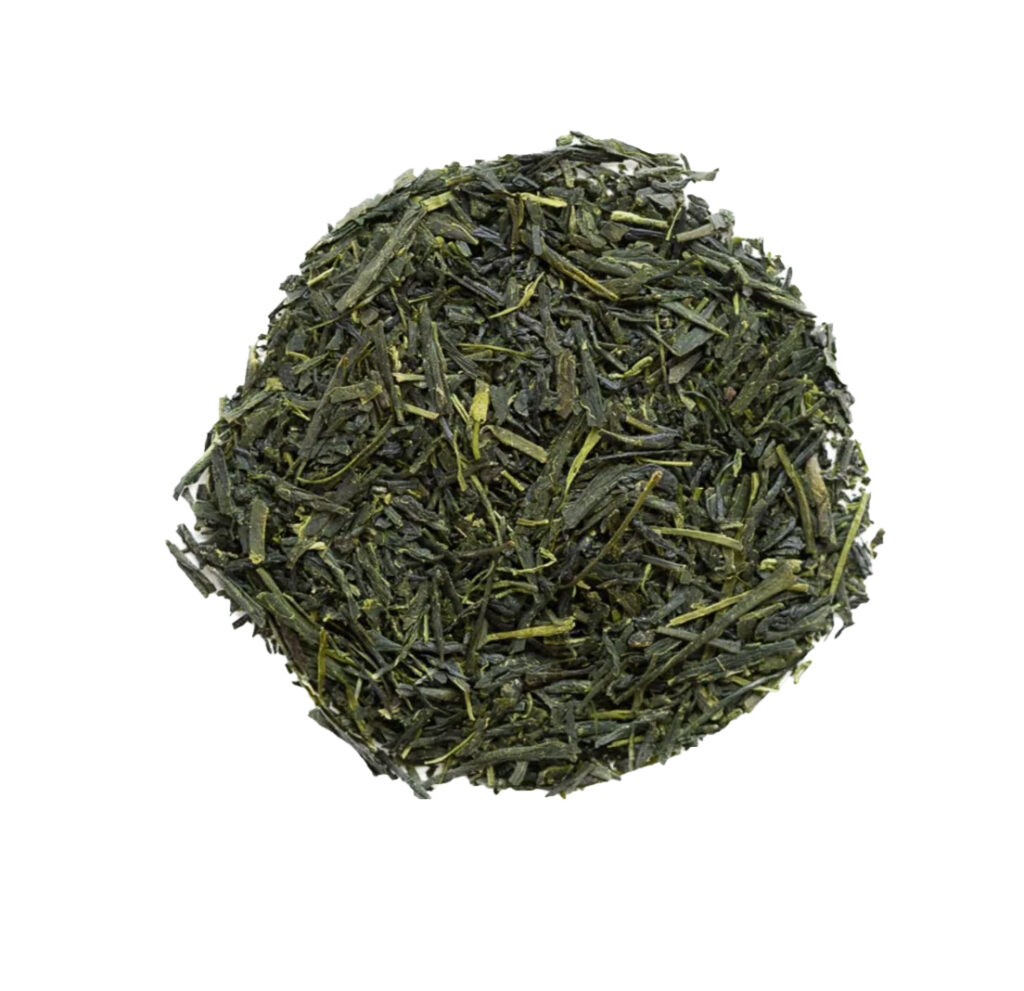
Kabusecha stands as Japan’s perfect balance in the green tea world. This special tea sits between regular and fully-shaded varieties, with farmers covering the plants for about two weeks before harvest.
This partial shading boosts the leaves’ sweetness and umami flavor while keeping a fresh taste that many tea fans enjoy. The process creates a vibrant green color that signals its quality and careful growing methods.
Tea masters prize Kabusecha for its balanced profile that offers more depth than standard sencha but remains more approachable than intense gyokuro. The tea contains moderate caffeine and high antioxidant levels, making it both tasty and beneficial.
Japanese tea ceremonies often feature this tea type because it represents harmony in both flavor and preparation. For best results, brew Kabusecha with cooler water and shorter steep times than other green teas.
Regional Specialties (Uji, Shizuoka)
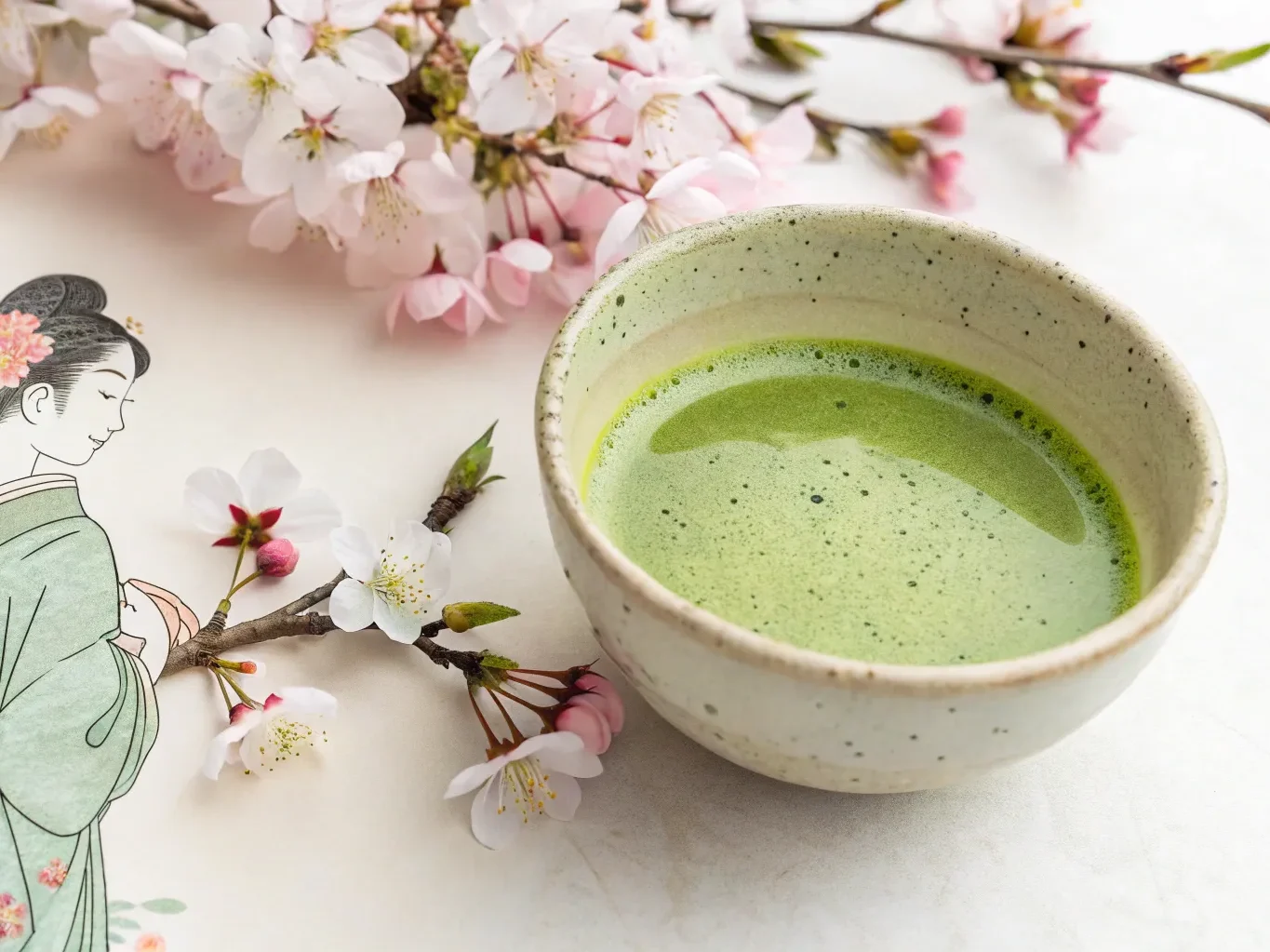
Japan’s tea regions produce distinct green tea varieties with unique flavors. These regional differences stem from climate, soil, and local processing methods.
- Uji tea comes from Kyoto and holds premium status in Japanese tea culture. Uji produces exceptional gyokuro and matcha due to its perfect growing conditions.
- Tea masters in Uji follow traditions dating back centuries, creating teas with deep umami flavors. The area’s misty climate and mineral-rich soil contribute to its tea’s sweet, complex taste profile.
- Shizuoka Prefecture dominates Japanese tea production with 40% of all sencha made there. Its varied terrain from mountains to coastlines creates diverse growing zones for different tea styles.
- Mount Fuji’s shadow provides ideal growing conditions in Shizuoka with volcanic soil enhancing mineral content. Many tea farms here balance traditional methods with modern technology.
- Shizuoka teas often feature bright, grassy notes with a clean finish compared to Uji’s deeper flavors. The region’s coastal influence adds a subtle briny quality to some varieties.
- Tea tourism thrives in both regions, with visitors enjoying tea house experiences and farm tours. Many farms offer tasting sessions where guests can sample first-harvest teas.
- Each area maintains strict quality standards, with local tea associations grading and certifying authentic regional products. These certifications help buyers identify genuine regional specialties.
- Climate change presents challenges for both regions, forcing growers to adapt cultivation practices. Some farmers now grow tea at higher elevations to maintain quality.
Next, we’ll explore the fascinating world of matcha and other specialty green tea categories that have gained global popularity.
Understanding Harvest Seasons (Shincha, Standard, Late)
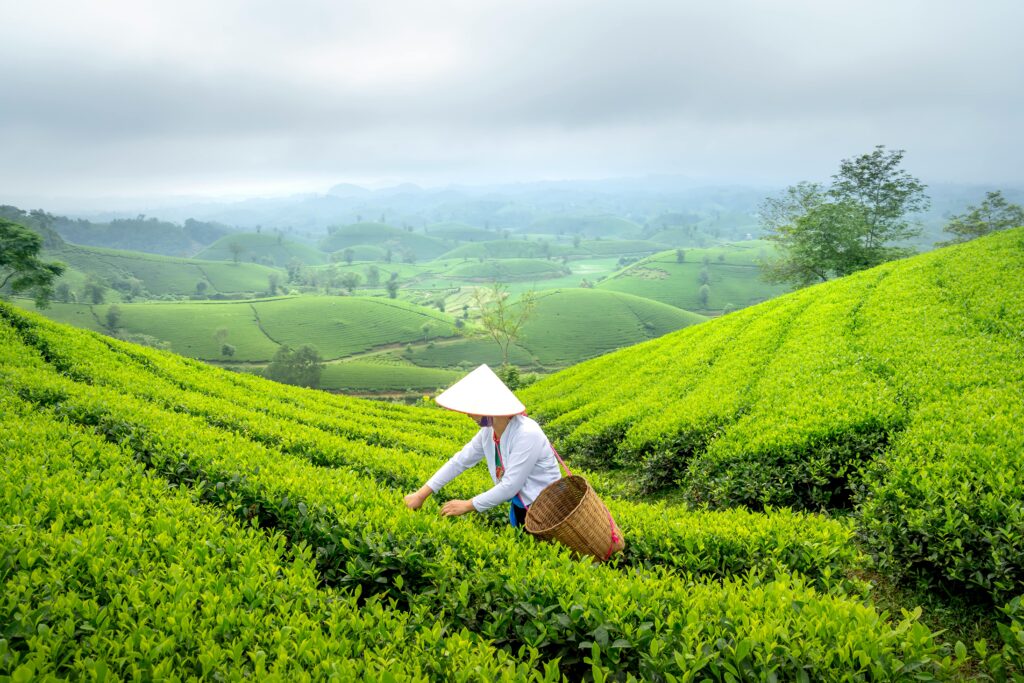
Green tea harvest seasons greatly impact flavor, quality, and price of your tea. Each season brings unique characteristics to the tea leaves, creating distinct taste profiles throughout the year.
- Shincha represents the first harvest of spring, occurring in early April through May in Japan. This prized “new tea” contains higher levels of amino acids, giving it a sweeter, more delicate flavor than later harvests.
- Ichibancha marks the official first harvest season, also marketed as shincha or “new tea.” Tea farmers carefully pick these tender young shoots for premium teas like gyokuro and high-grade sencha. While ichibancha and shincha refer to the same first harvest, vendors often label the earliest batches as shincha to emphasize their freshness.
- Nibancha (second harvest) takes place during summer months, producing stronger, less sweet teas. These leaves grow faster in warm weather, resulting in higher caffeine content but fewer amino acids.
- Sanbancha (third harvest) occurs in late summer, creating more robust, full-bodied teas. These leaves develop thicker cell walls and contain more tannins, creating a deeper flavor profile.
- Harvest timing affects the tea plant’s natural compounds significantly. Early spring harvests contain more L-theanine, creating that prized umami taste in premium green teas.
- Shincha commands higher prices due to its limited availability and superior taste profile. Many tea enthusiasts eagerly await this special seasonal release each spring.
- Temperature variations between seasons directly impact tea flavor development. Spring’s cool nights and warm days create ideal conditions for developing complex flavors in the tea leaves.
- Late harvest teas (Shuutoubancha/Harubancha) from fall months offer more affordable options with stronger, less nuanced flavors. These teas serve as excellent daily drinking options.
- Tea farmers must balance harvest timing with weather conditions each year. Unexpected frost or rain can delay harvests and affect the entire season’s production.
- Japanese tea grading systems often incorporate harvest season as a key quality indicator. First-flush teas typically receive higher grades than later harvests from the same fields.
- Different tea varieties respond uniquely to seasonal changes. Shade-grown teas like matcha benefit most from early spring harvests when chlorophyll levels peak.
- Modern tea processing techniques help preserve the distinct characteristics of each harvest season. Flash-freezing technology allows shincha to maintain its fresh qualities year-round.
Senbird Premium Gyokuro Japanese Green Tea
Authentic Kyoto gyokuro that's remarkably forgiving—premium shade-grown flavor without intimidating brewing demands.
Gyokuro represents what happens when you shade tea plants before harvest—the leaves develop deeper umami and a sweeter, less astringent character. This Kyoto-sourced example delivers that premium shade-grown experience while remaining forgiving for those still refining their brewing technique. Ten reviewers noted it's nearly impossible to overbrew into bitterness.
⚠️ Skip this if you need budget-friendly daily drinker volume—gyokuro pricing means savoring small, intentional servings rather than all-day refills.
Types of Green Tea from China
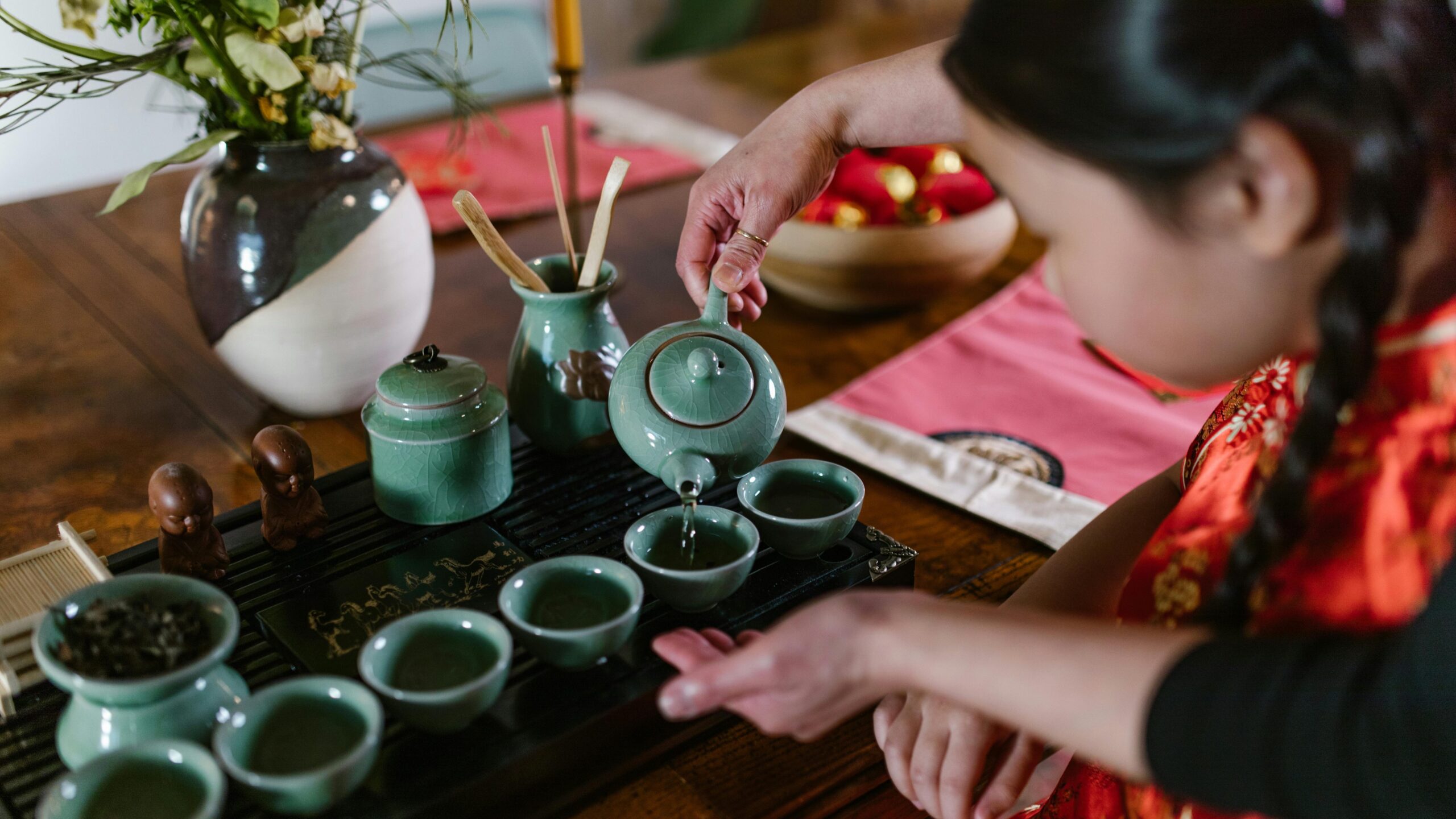
China produces some of the world’s most prized green teas, from the flat-pressed leaves of Dragon Well to the tiny spirals of Bi Luo Chun, each with distinct flavors shaped by local growing conditions and ancient processing methods.
Discover these treasures and more in our complete guide to Chinese green teas!
Longjing (Dragon Well): The Imperial Classic
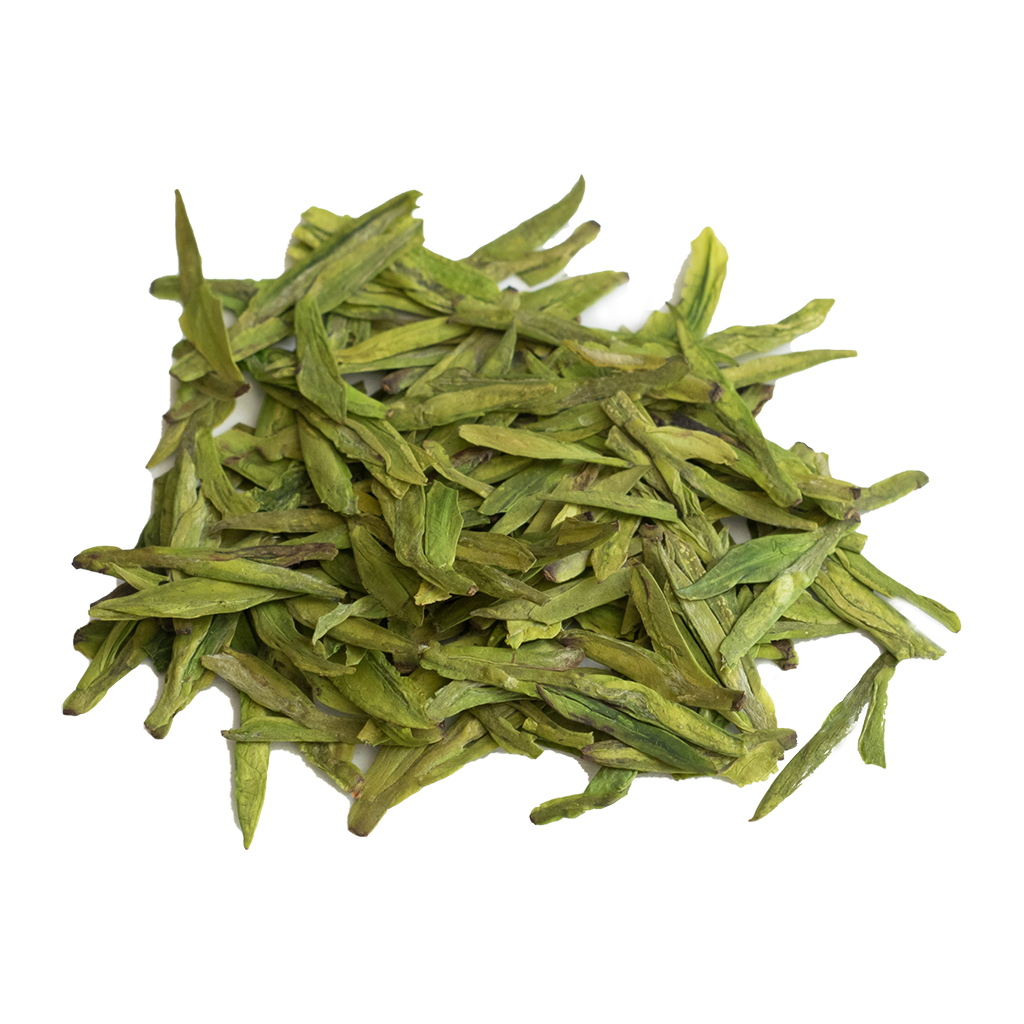
Longjing tea stands as the most famous green tea from China, prized for its distinct nutty and vegetal flavor notes. Tea masters in Longjing village of Zhejiang Province craft this imperial beverage through careful pan-firing techniques that lock in its unique taste profile.
The flat, sword-shaped leaves result from skilled hand movements during processing, creating the signature appearance that tea lovers recognize worldwide.
You can spot authentic Longjing by its bright green color and smooth, flat shape. After harvest, the fresh leaves undergo immediate pan-firing in woks, a process that stops oxidation and preserves the tea’s natural compounds.
This traditional method dates back centuries and remains largely unchanged, giving Longjing its status as a cultural treasure. The tea delivers a sweet, mellow cup with chestnut hints that many tea drinkers find approachable yet complex enough for deeper appreciation.
Bi Luo Chun: Spring Spiral Leaves
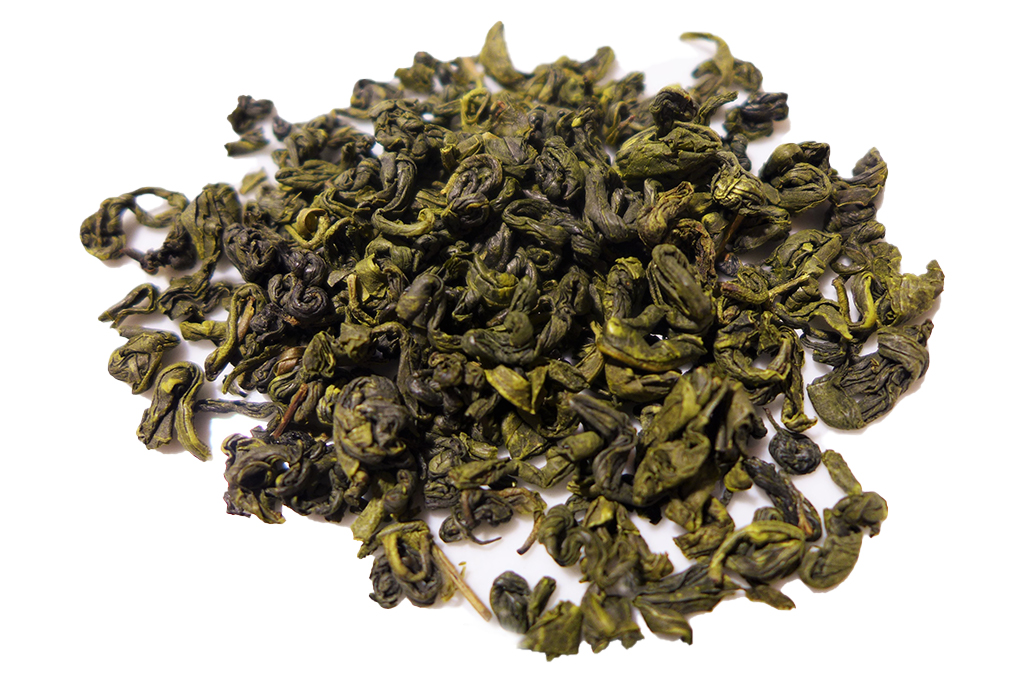
Bi Luo Chun ranks as one of China’s most treasured green teas, famous for its distinctive spiral-shaped leaves that curl during processing. Tea farmers harvest these delicate leaves in early spring when the tea plants first awaken from winter dormancy.
The young buds and leaves grow amid fruit trees in the mountains, which gives this tea its signature fruity aroma that many tea lovers prize.
The flavor profile of Bi Luo Chun offers a perfect balance of sweet and vegetal notes with a smooth finish that lingers pleasantly. Each sip delivers a bright, clear taste that changes subtly through multiple steepings.
Chinese tea masters consider this variety special because it packs incredible flavor into tiny leaves – a sign of exceptional quality in the tea world. Many green tea fans start their tasting journey with more common varieties but eventually discover the refined taste of this spring-harvested delight.
Huang Shan Mao Feng: Yellow Mountain’s Treasure
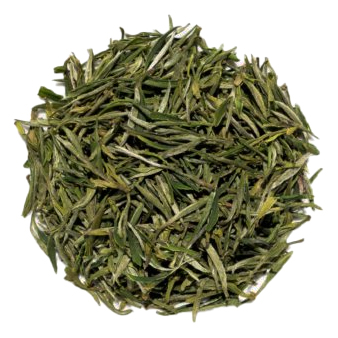
Huang Shan Mao Feng ranks as one of China’s most treasured green teas, grown in the misty heights of Yellow Mountain. The name “Mao Feng” translates to “Fur Peak,” pointing to the tea’s distinctive downy appearance and premium quality leaves.
Farmers harvest this tea from plants that thrive in the region’s rich soil and foggy climate, creating a brew with a sweet, delicate flavor profile and spring grass aroma.
This exceptional tea undergoes minimal processing to preserve its natural benefits and vibrant green color. Tea drinkers value Huang Shan Mao Feng for its antioxidant properties that may support heart and brain health.
Each cup offers a taste of Chinese tea culture and reflects centuries of tea-making skill. The light, refreshing taste makes it popular among both new tea fans and seasoned green tea drinkers looking for authentic single-origin varieties.
Liu An Gua Pian: Unique Processing Method
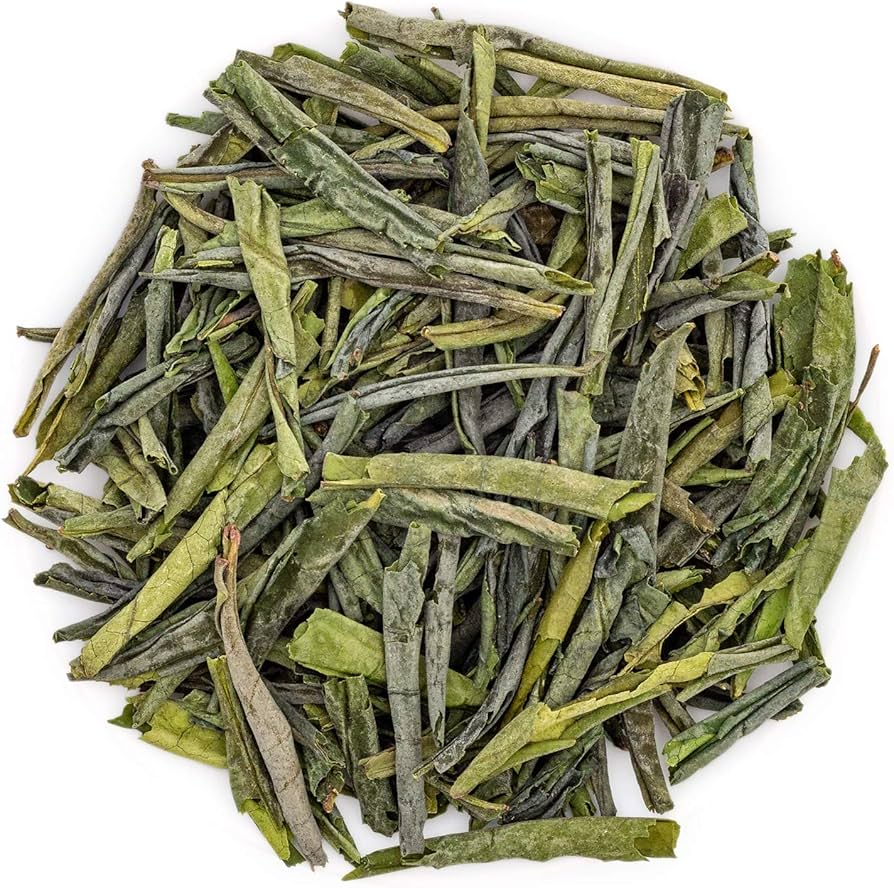
Liu An Gua Pian stands out in the green tea world for its distinct processing technique. Tea makers in Liu An County, Anhui Province select only single leaves that look like melon seeds, giving this tea its name (“Gua Pian” means melon seeds).
Unlike most green teas, Liu An Gua Pian contains no buds or stems—just pure leaves that undergo careful pan-firing at low temperatures.
The unique taste of this tea comes from its special processing steps. After picking, workers remove stems and veins from each leaf before pan-frying them. This careful method creates a tea with a sweet, mellow flavor and rich aroma that tea fans prize.
The finished leaves maintain their vibrant green color while developing a slightly curved shape that truly resembles melon seeds.
Modern Chinese Green Tea Innovations
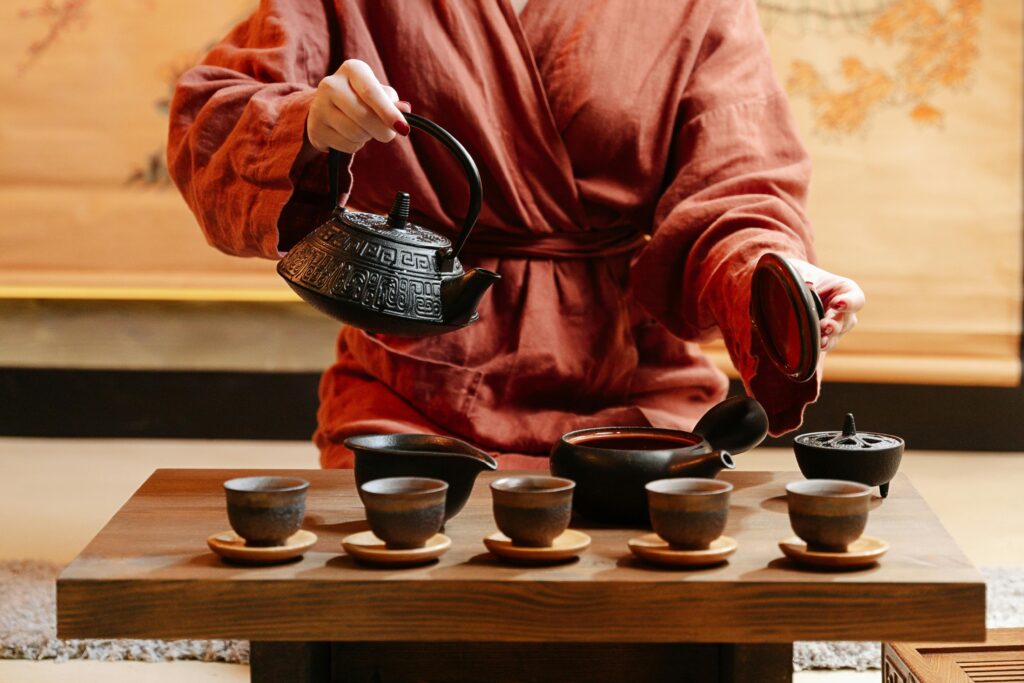
Chinese tea makers have embraced new techniques while honoring ancient traditions. Many producers now use temperature-controlled chambers for precise drying, resulting in more consistent flavors across batches.
This technology helps maintain the vibrant green color and fresh taste that tea lovers expect from high-quality green teas like Longjing and Bi Luo Chun.
Farmers in China’s tea regions have also developed sustainable growing methods that reduce chemical use. These eco-friendly practices protect both the environment and tea quality. Some innovative producers create fusion teas that blend green tea with local fruits or flowers, appealing to younger drinkers who enjoy new flavor profiles.
These modern blends often appear in trendy tea shops throughout Asia and beyond.
Chinese tea companies now package their products in oxygen-proof containers with one-way valves to preserve freshness longer. This packaging innovation helps maintain the delicate compounds in green tea that provide both flavor and health benefits.
Tea lovers worldwide can now enjoy authentic Chinese green teas at their peak quality, whether they’re drinking traditional Dragon Well or exploring new regional varieties from emerging tea-growing areas.
FullChea Longjing Dragonwell Green Tea
Authentic Dragonwell character in generous quantity—learn what pan-fired Chinese green tea should taste like.
Longjing from Zhejiang province sets the standard for pan-fired Chinese greens—flat, sword-shaped leaves with toasted chestnut notes and a clean finish. This FullChea version offers authentic Longjing character at a fraction of premium pricing. Eight reviewers confirmed good taste quality, and the 250g package means plenty of leaves for daily exploration.
⚠️ Skip this if you're chasing multiple complex infusions from the same leaves—this is built for one or two good steeps, not a long gongfu session.
Specialty Green Tea Categories
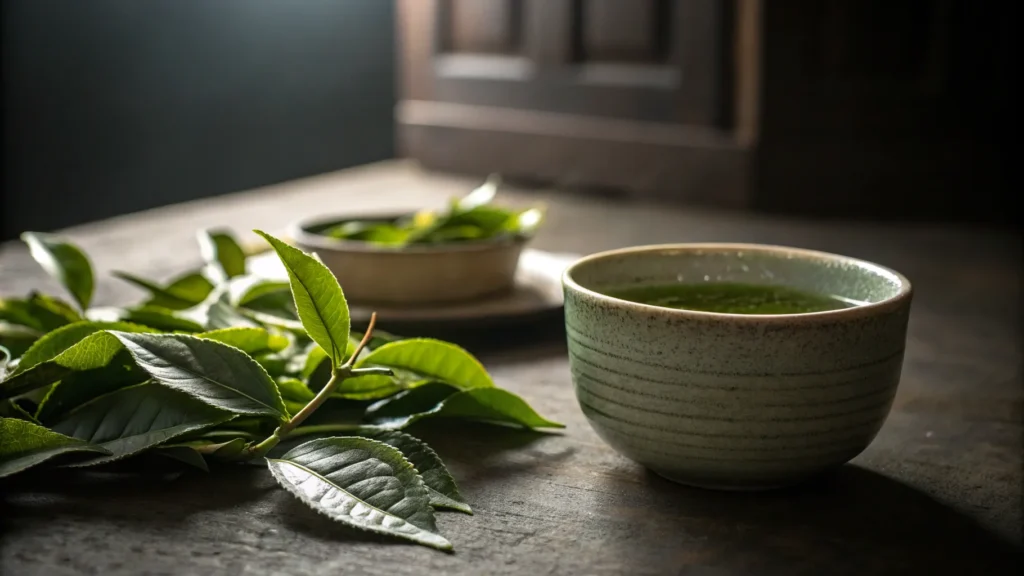
Specialty green tea categories like matcha and hojicha offer unique flavors beyond standard green teas, each with distinct processing methods that create bold tastes and health benefits.
Discover these special varieties to expand your tea knowledge!
Matcha: Powdered Green Tea Excellence
Matcha stands as the crown jewel of green teas, ground into a fine powder that dissolves completely in water. This vibrant green powder comes in two main grades: Ceremonial and Culinary.
Ceremonial grade offers a sweet umami flavor perfect for drinking straight, while Culinary grade has a stronger, more bitter taste ideal for cooking and recipes. The unique processing method preserves matcha’s rich antioxidant content, making it a powerhouse for health benefits.
You’ll find matcha delivers more than just great taste – it provides stress relief and energy improvement without the crash often linked to coffee. Unlike regular green tea where leaves are steeped and discarded, matcha allows you to consume the entire tea leaf, maximizing its nutritional value.
This Japanese tradition has gained global popularity for both its distinct flavor profile and impressive health properties. Many tea enthusiasts appreciate matcha’s versatility in traditional tea ceremonies and modern culinary applications.
Shade-Grown Varieties
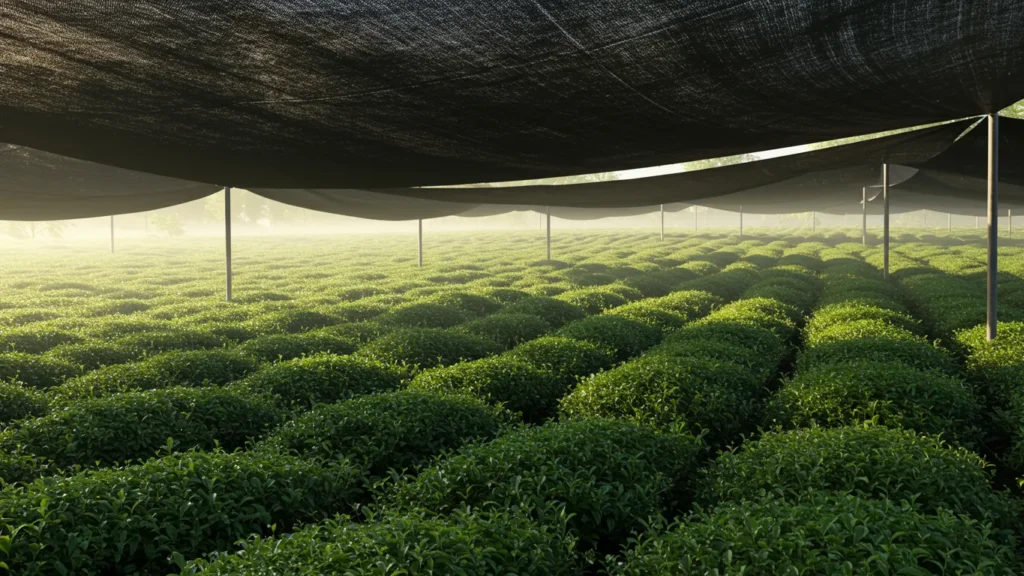
Beyond powdered matcha, shade-grown green teas form a special category with unique traits. These teas develop distinct flavors and higher nutrient content through careful light restriction during growth.
- Shade-grown teas contain more amino acids, especially L-theanine, which creates a sweet, umami flavor profile that balances any bitterness.
- Farmers use special screens or coverings to block 70-90% of sunlight for specific periods before harvest, forcing tea plants to produce more chlorophyll.
- The shading process increases chlorophyll levels in the leaves, giving these teas their vibrant green color and boosting their antioxidant content.
- Japanese gyokuro ranks as the most prized shade-grown tea, shaded for 20-30 days before picking, resulting in sweet, complex flavors with minimal astringency.
- Kabusecha sits between sencha and gyokuro in the quality spectrum, shaded for only 1-2 weeks, offering a middle-ground price point with some shade-grown benefits.
- Tencha leaves, the base material for matcha production, grow under shade for up to four weeks before careful de-stemming and de-veining.
- The shade-growing method dates back to the 16th century in Japan, developed to preserve tea quality for imperial ceremonies.
- Modern studies show shade-grown teas contain up to three times more L-theanine than standard green teas, contributing to their calming effects.
- These specialty teas require lower brewing temperatures (140-160°F) than regular green tea to prevent bitterness and extract their delicate flavors.
- Shade-grown varieties cost more due to their labor-intensive production methods and lower yield per acre compared to full-sun teas.
Stem Teas (Kukicha, Karigane)
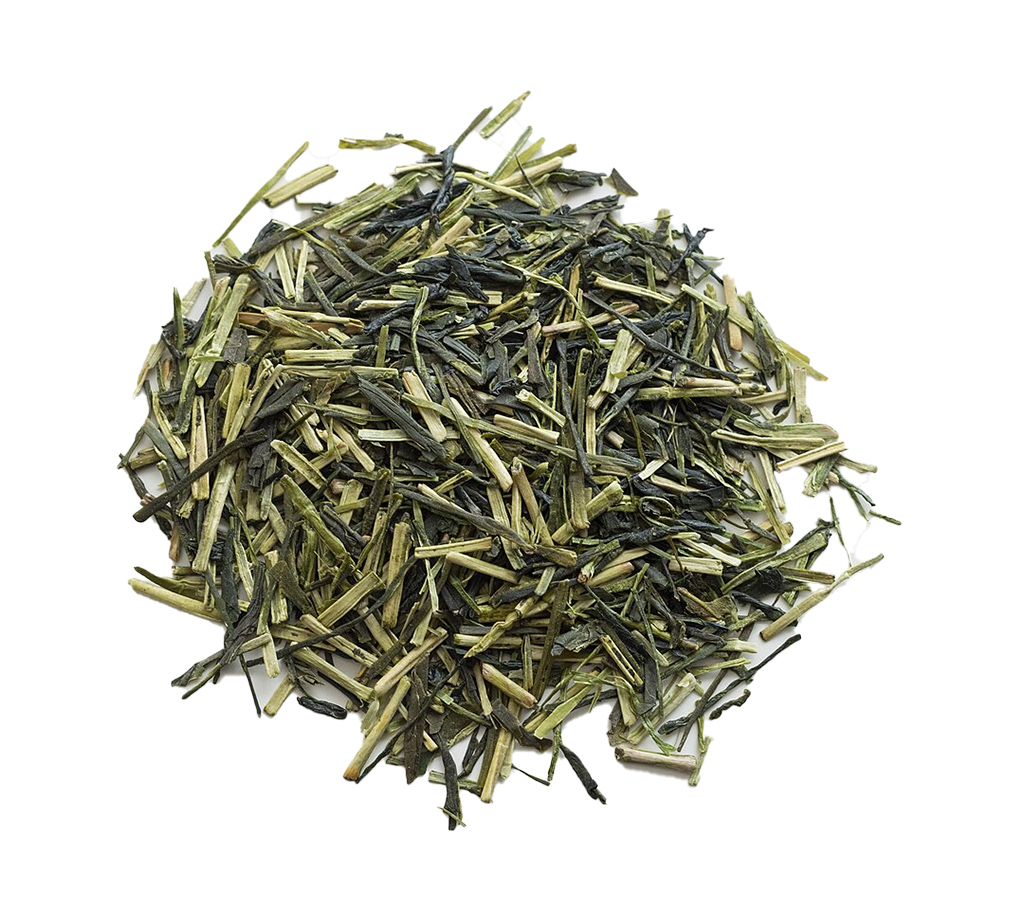
Kukicha offers a unique twist in the green tea world as it breaks from tradition by using twigs, stems, and stalks instead of leaves. This Japanese specialty creates a light, slightly sweet cup with nutty notes that many tea lovers enjoy.
The best part? Kukicha contains higher theanine levels than leaf-based green teas, which helps lower blood pressure and promotes relaxation without heavy caffeine effects.
Karigane represents the luxury version of stem tea, made exclusively from the stems of shade-grown Gyokuro leaves. Tea masters carefully select these premium stems during processing, resulting in a more complex flavor profile with sweet, umami notes.
Both stem teas provide excellent alternatives for evening drinking since they deliver the health benefits of green tea with gentler stimulation. Many tea enthusiasts appreciate these varieties for their distinctive taste and their ability to be steeped multiple times without becoming bitter.
Roasted Green Teas (Hojicha)
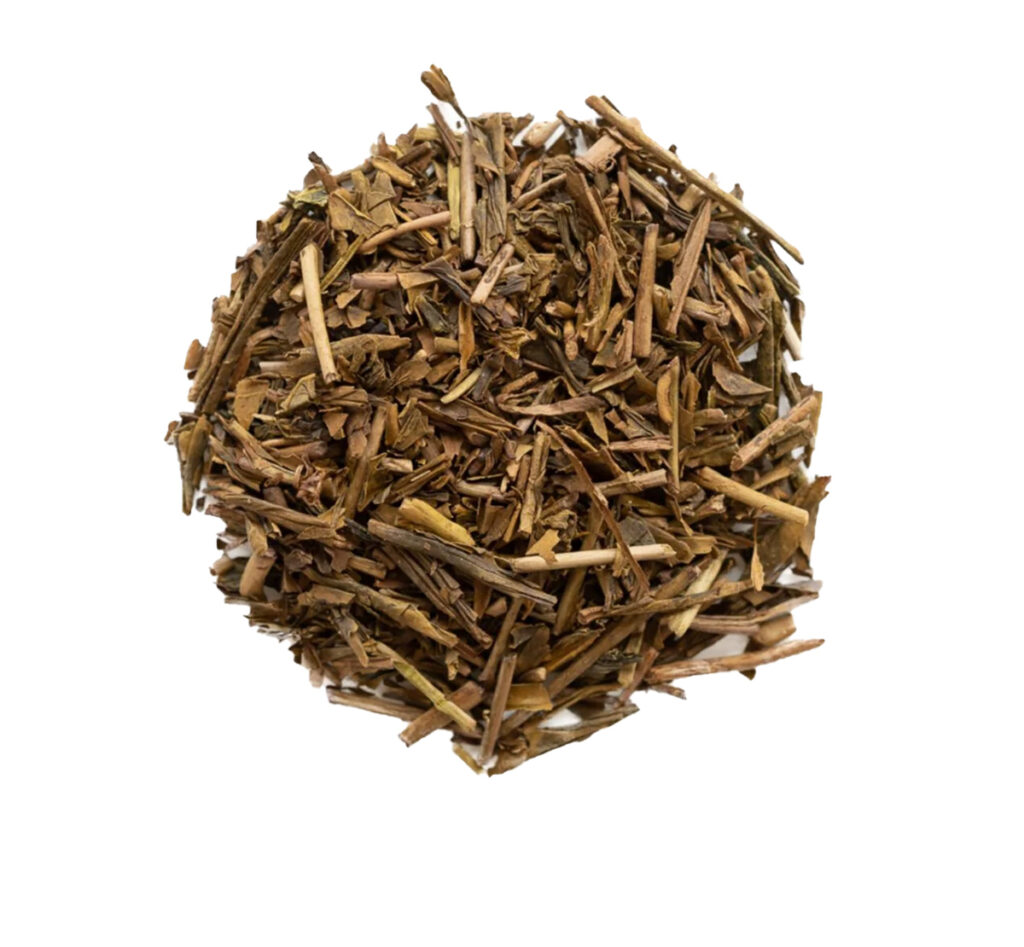
Hojicha stands apart from other green teas thanks to its unique roasting process. Unlike standard green varieties, this Japanese tea features roasted leaves and stems that create its signature toasty, nutty flavor profile.
The roasting transforms the tea’s bright green color into a warm reddish-brown hue. Tea drinkers with caffeine sensitivity often prefer hojicha because the roasting process reduces its caffeine content significantly compared to regular green tea.
Many tea shops offer hojicha in various roast levels, from light to dark, each providing different taste experiences. The lighter roasts maintain subtle vegetal notes while darker versions develop rich caramel and coffee-like qualities.
You can brew hojicha hot or cold, making it a versatile option throughout the year. Its smooth, comforting taste pairs well with food and makes it popular both as an everyday drink and as a relaxing evening option when you want to limit caffeine intake.
Rice-Blended Teas (Genmaicha)
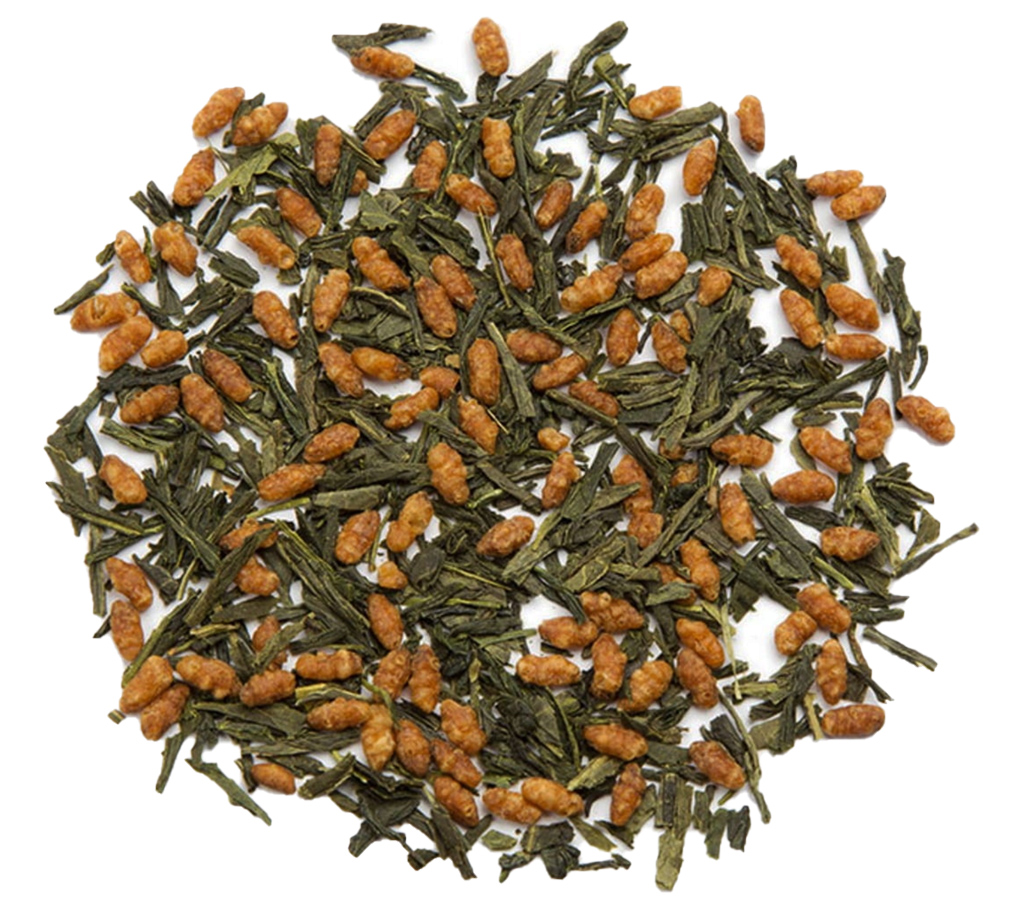
Genmaicha stands out in the green tea world as a unique blend of sencha and roasted brown rice. This Japanese creation delivers a toasty flavor profile with earthy notes that set it apart from other green teas.
The rich amber brew offers tea drinkers a less grassy taste than pure sencha, making it an ideal choice for those new to green tea. Many tea fans appreciate how the roasted rice adds a nutty warmth that balances the fresh vegetal qualities of the tea leaves.
The history of genmaicha reflects practical origins – Japanese families once mixed their tea with rice to make supplies last longer during tough economic times. Today, this tea enjoys popularity both in Japan and worldwide for its distinct taste rather than necessity.
You can find genmaicha in various quality levels, from everyday versions to premium blends using high-grade sencha. The caffeine content typically measures lower than pure green tea because the rice dilutes the overall tea concentration.
Akira Matcha Organic Ceremonial Green Tea Powder
First-harvest Uji matcha with vibrant color and natural sweetness—froths beautifully for traditional preparation.
Ceremonial matcha from Uji, Kyoto represents the pinnacle of Japanese green tea—stone-ground first-harvest leaves with vibrant green color and natural sweetness. Eighteen reviewers praised this matcha's rich green color, and 15 noted its smooth, naturally sweet taste with minimal bitterness—exactly what ceremonial grade should deliver.
⚠️ Skip this if you're making matcha lattes daily and want maximum volume for your dollar—ceremonial grade pricing makes more sense for focused, traditional preparations.
Notable Regional Varieties
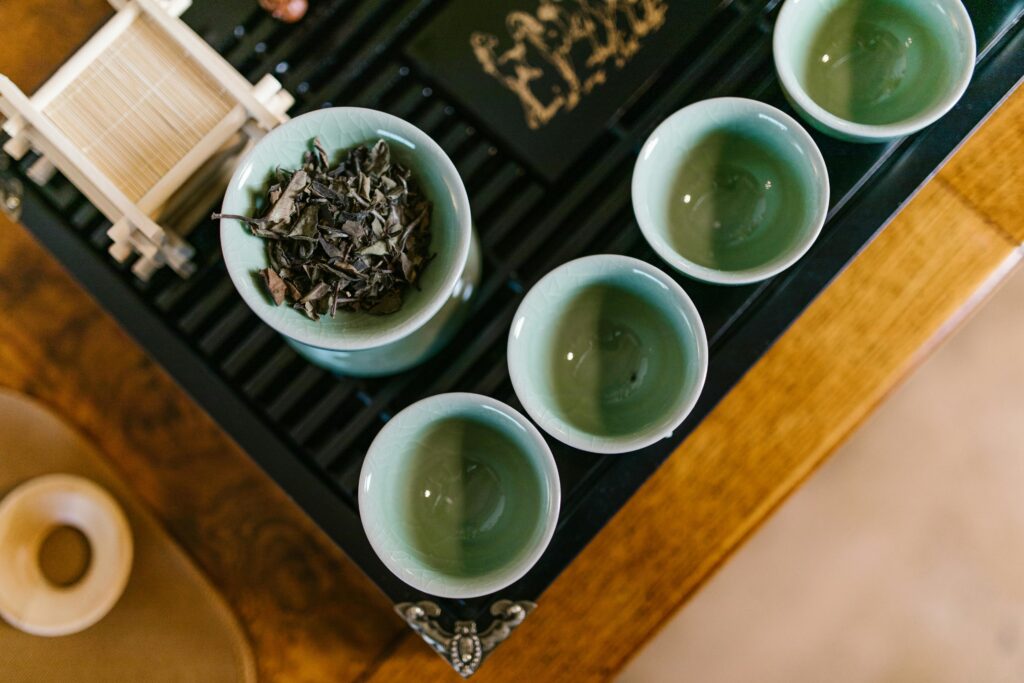
Beyond Japan and China, green tea flourishes in regions with distinct styles that reflect local growing conditions and cultural practices—discover Korean Sejak with its delicate sweetness, Vietnamese green teas with their robust profiles, and even new American craft tea farms creating unique expressions of this ancient beverage.
Korean Green Teas (Sejak, Jungjak)
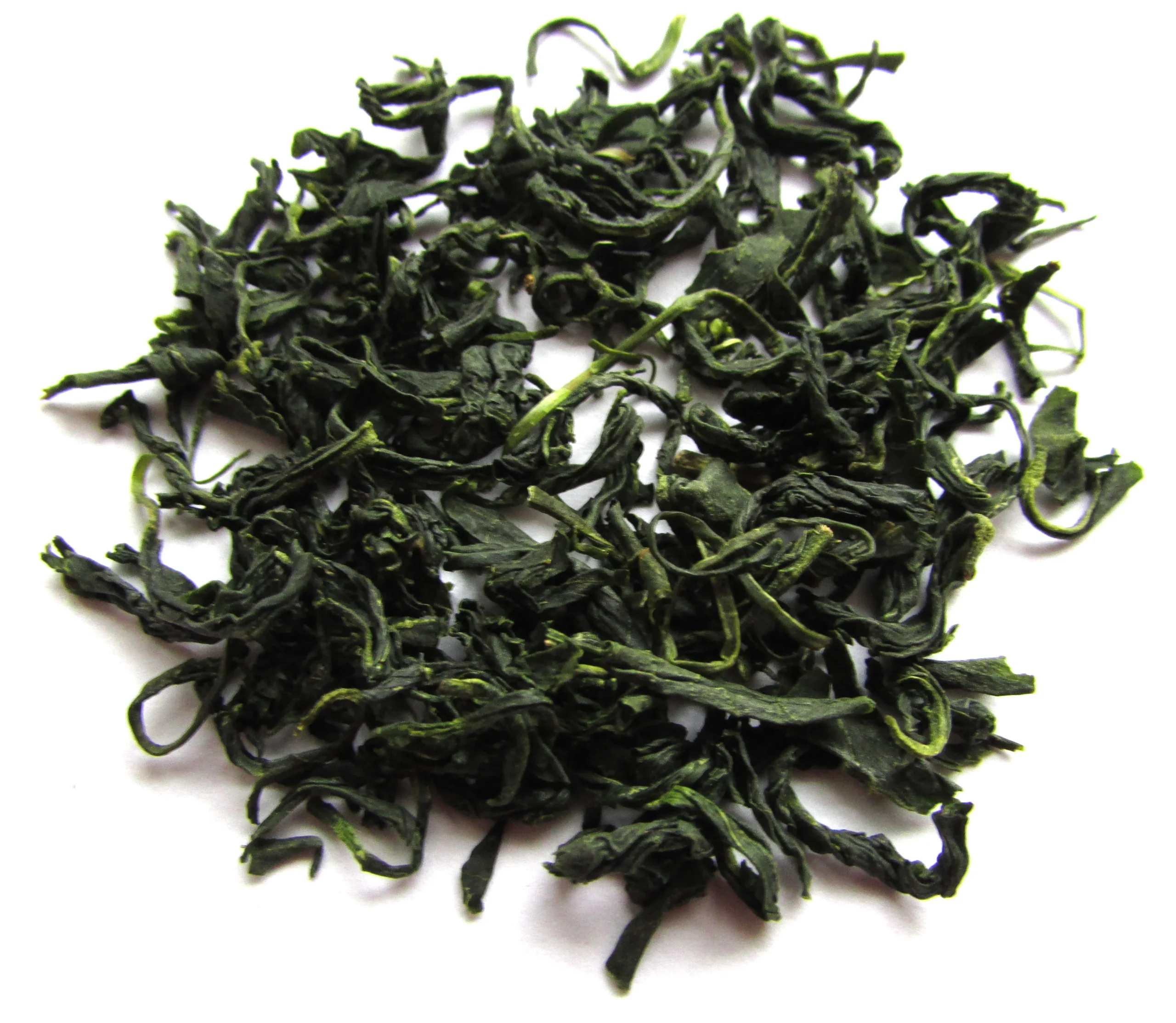
Korean green teas offer unique flavors that differ from their Japanese and Chinese cousins. Sejak, a premium Korean green tea grown on Jeju Island, delivers a brothy, vegetal flavor profile with smooth, mildly astringent notes.
Tea farmers harvest Sejak in early spring when the leaves have just begun to unfurl, creating its distinctive taste. This tea contains moderate caffeine content and pairs well with light meals or meditation practices.
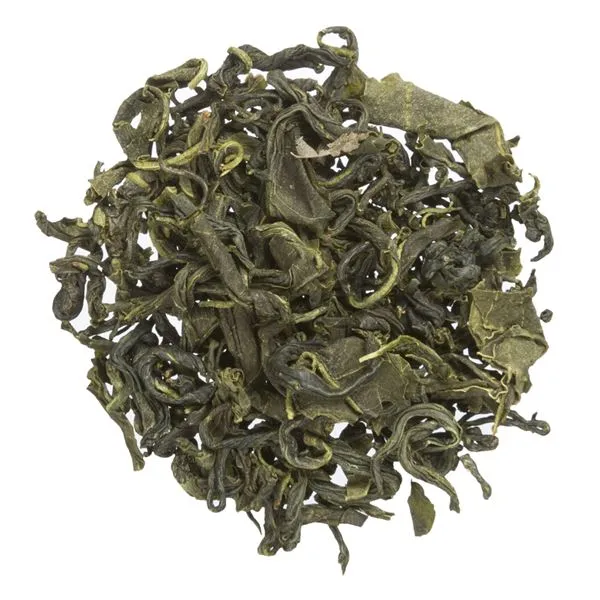
Jungjak represents the next harvest after Sejak, picked when leaves have grown slightly larger. This Korean tea provides a more robust flavor with less sweetness than its earlier-harvested counterpart.
Many tea enthusiasts appreciate Jungjak for its accessibility and lower price point compared to Sejak. The processing methods for these teas involve careful hand-picking followed by pan-firing, which helps develop their characteristic taste while preserving beneficial compounds linked to heart health and metabolism support.
Vietnamese Green Teas
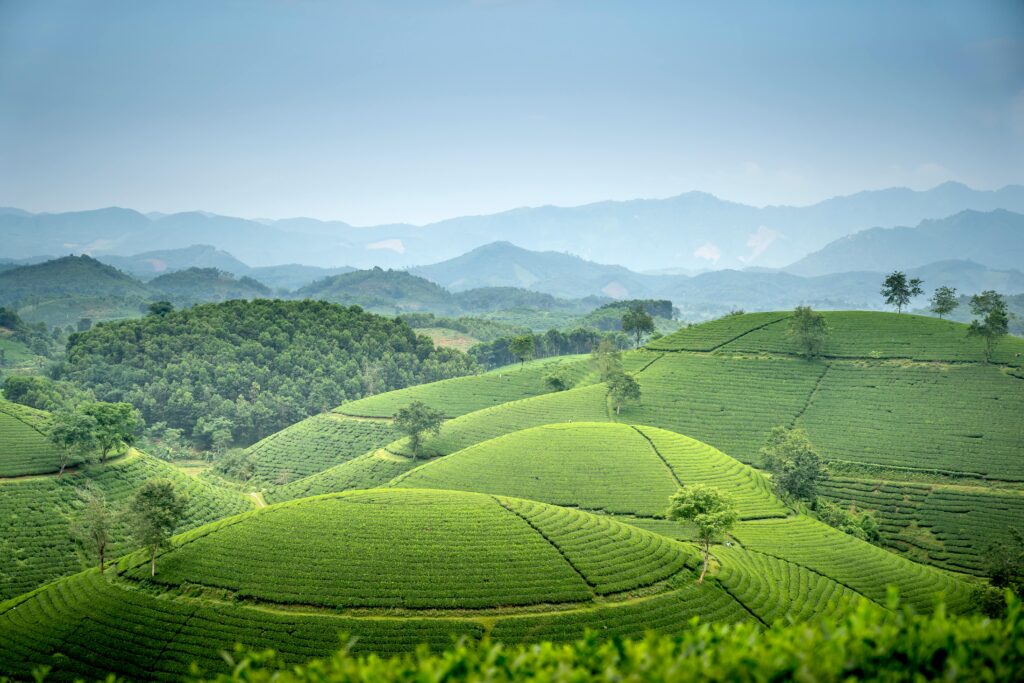
Vietnamese green teas offer unique flavors that stand apart in the global tea landscape. TRA XANH serves as the most common variety, prized for its fresh taste and slight bitterness that tea enthusiasts appreciate.
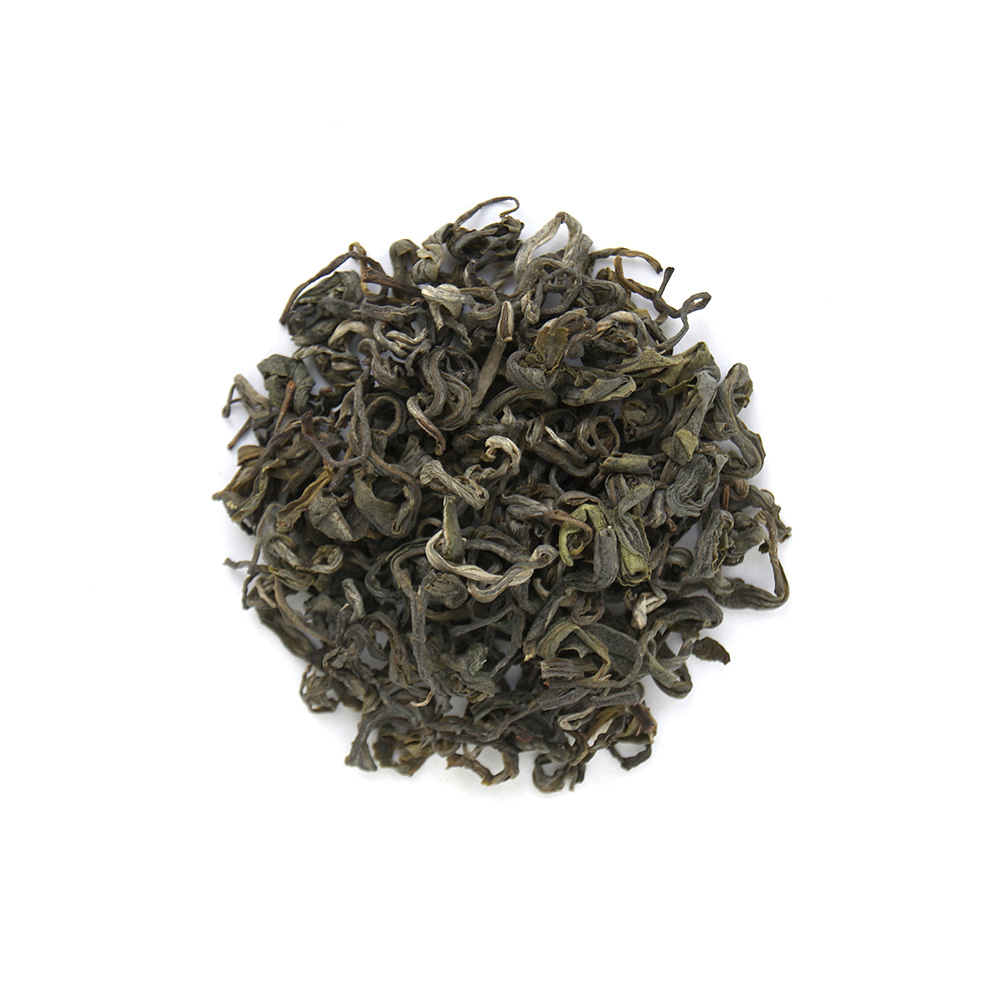
Many tea drinkers discover that TRA SHAN TUYET, grown in mountainous regions, delivers more complex flavor notes with distinctive aromatic qualities not found in other green teas.
The Vietnamese also produce specialty varieties like TRA SEN, a lotus-scented green tea, and TRA CHE, which features a more robust profile. These teas maintain traditional processing methods while adapting to modern tastes.
Unlike Japanese or Chinese varieties, Vietnamese green teas often balance their natural bitterness with aromatic qualities that make them accessible to new tea drinkers. The production focuses on preserving freshness through careful handling of the leaves after harvest.
Modern American and European Productions
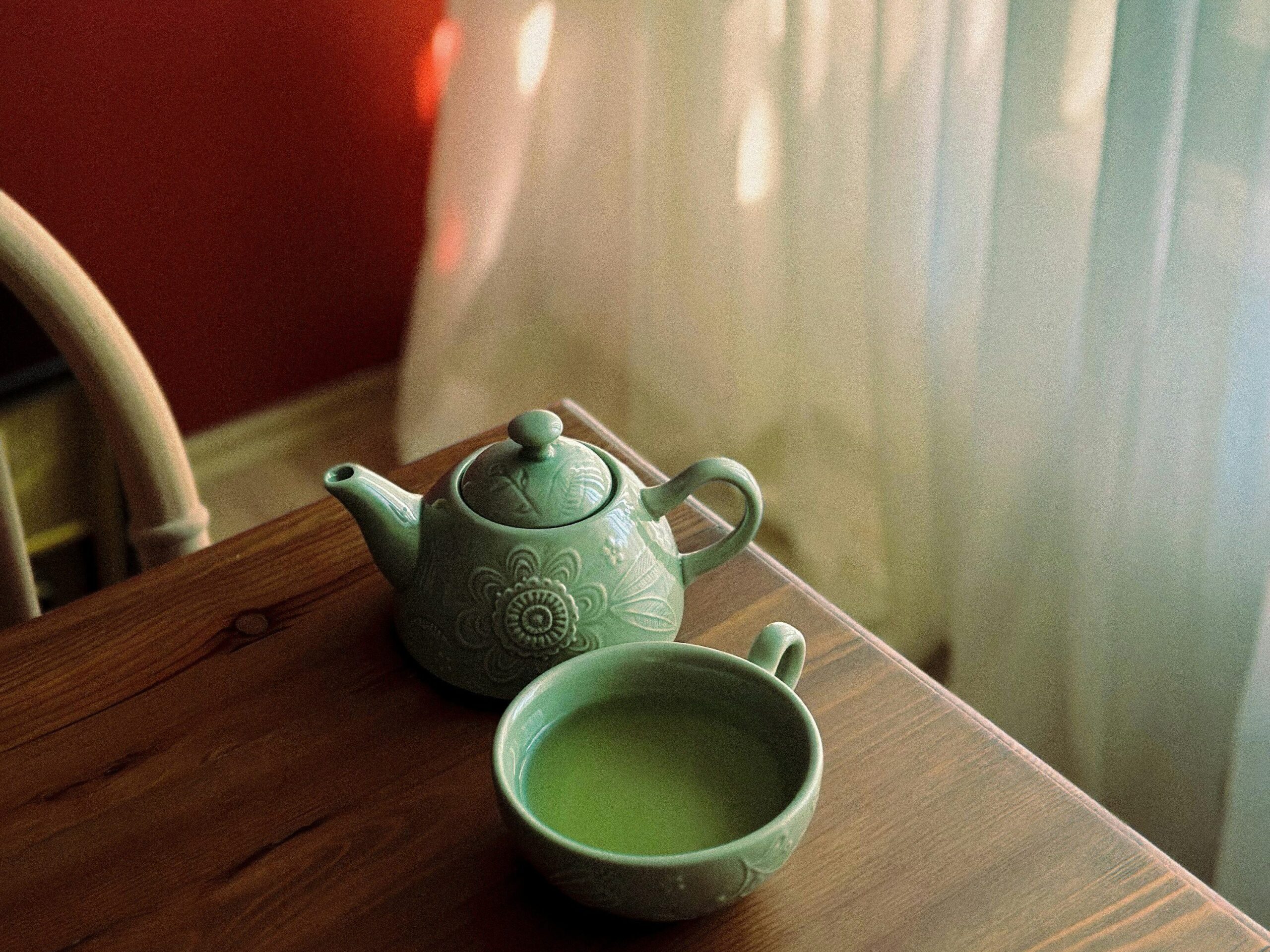
American tea farms now grow green tea in states like South Carolina, Hawaii, and Washington. These U.S. producers blend Eastern methods with Western innovation to create unique flavors that appeal to local tastes.
Many focus on sustainable farming and small-batch processing that rivals Asian traditions. European tea makers in France and Germany have also entered the market with distinct green tea styles that feature local herbs and processing techniques.
Tea culture has spread globally, leading to new green tea expressions outside traditional Asian regions. European producers often create fusion styles that mix classic methods with regional preferences.
American tea gardens typically use organic practices and highlight seasonal harvests. Both regions now host tea festivals where craft producers showcase their green teas alongside established Asian varieties.
This global expansion brings fresh perspectives to an ancient drink while respecting its cultural roots.
Global Adaptation of Green Tea Processing
Green tea production has spread beyond traditional Asian regions to new territories worldwide. Countries like the United States now grow and process their own green teas, adapting classic methods to local conditions.
These new producers often blend traditional techniques with modern innovations, creating unique regional styles that reflect local tastes and growing conditions.
Tea farmers in different climates must adjust processing methods to maintain quality. Some American growers use modified steaming techniques similar to Japanese methods, while others adopt pan-firing approaches from China.
This global spread has created exciting new green tea varieties with distinctive flavors that showcase both tradition and innovation. Steaming and pan-firing remain the foundation of green tea processing, though each region adds its own twist to these time-honored techniques.
Emerging Single-Origin Green Teas
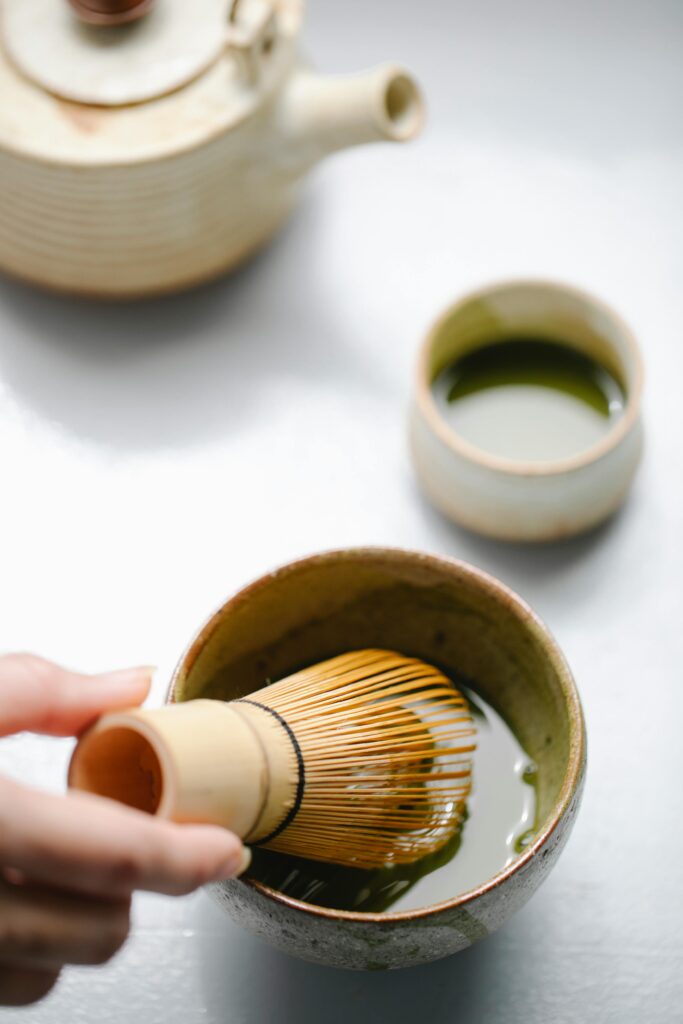
Tea lovers now enjoy access to unique single-origin green teas from regions beyond traditional growing areas. These distinctive teas showcase the impact of terroir, processing methods, and local tea traditions on flavor profiles.
- Nepali green teas offer bright, floral notes with hints of muscatel similar to Darjeeling but with their own unique character from Himalayan growing conditions.
- Vietnamese green teas feature bold vegetal flavors with subtle sweetness, grown in the northern highlands where climate conditions create exceptional leaf quality.
- Thai green teas deliver tropical fruit notes and smooth mouthfeel, often produced by hill tribes using methods that blend Chinese techniques with local innovations.
- Kenyan green teas present robust, malty profiles with distinct brightness, marking a shift from the region’s traditional black tea production to meet growing global demand.
- Taiwanese high mountain green teas showcase buttery texture and complex floral notes, produced in regions typically known for oolong production.
- Hawaiian green teas offer unique volcanic soil influence, creating cups with tropical fruit notes and mineral undertones from the island’s rich growing environment.
- Malawian green teas deliver bright, clean flavors with citrus notes, produced with sustainable farming practices that support local communities.
- Georgian green teas feature subtle sweetness with notes of nuts and fresh hay, reviving ancient Caucasus tea traditions with modern processing techniques.
- Australian green teas present eucalyptus hints and clean finish, grown in small-scale gardens along the eastern coast where climate conditions mirror traditional tea regions.
- New Zealand green teas offer crisp, grassy profiles with mineral notes, produced in limited quantities by artisanal tea farmers focused on quality over volume.
Understanding tea quality and tasting methods will help you appreciate these emerging varieties even more.
Understanding Tea Quality & Tasting
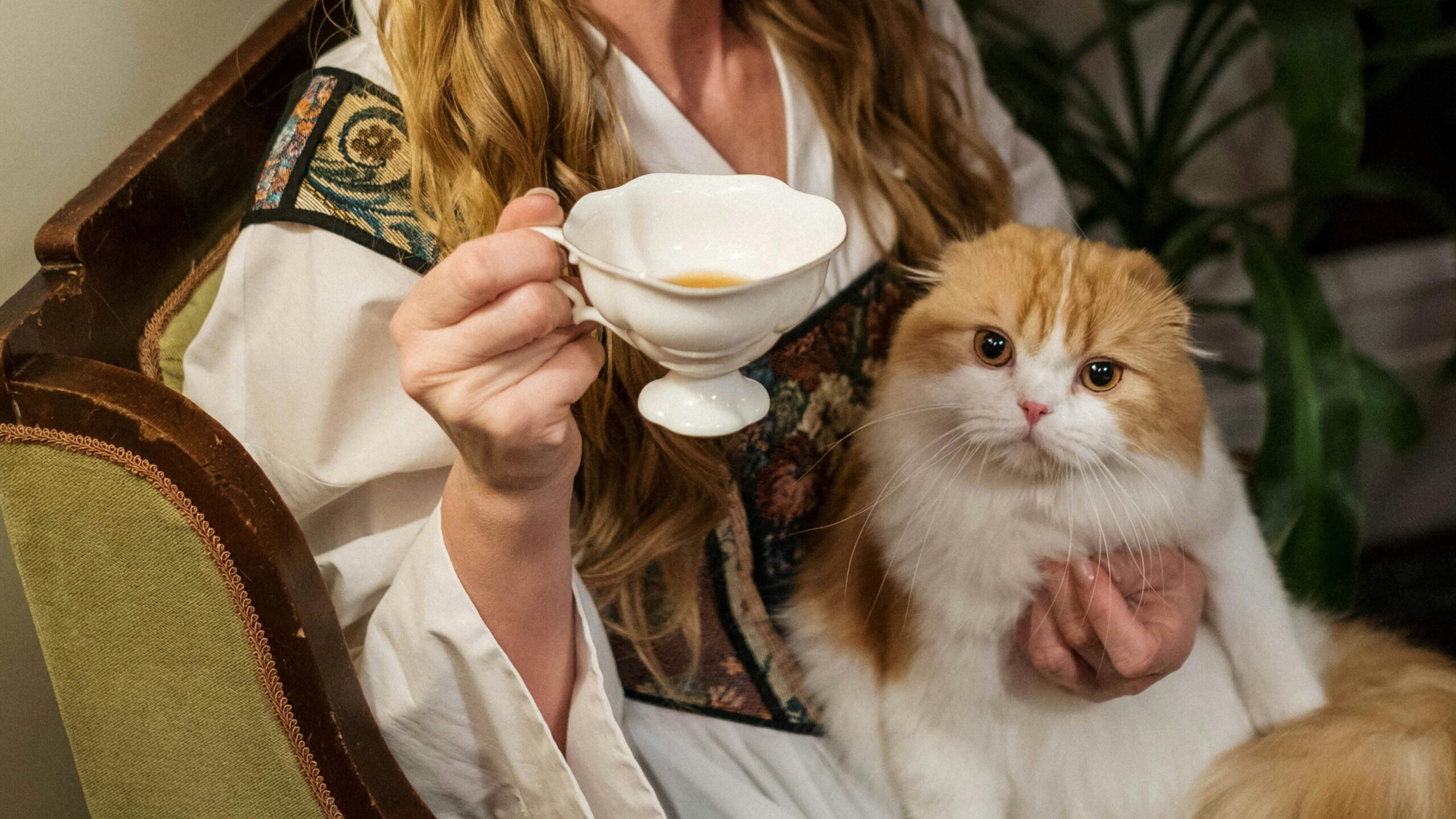
Learn to spot the finest green teas by mastering key quality markers and tasting skills that transform you from casual sipper to tea expert – read more to discover how your taste buds can detect the subtle notes that separate everyday tea from exceptional brews.
How to Choose Quality Green Tea
Quality green tea offers both superior taste and maximum health benefits. Selecting the best green tea requires attention to several key factors that impact flavor, aroma, and nutritional value.
- Examine the leaf appearance for whole, unbroken leaves which signal higher quality than broken or crushed pieces. Fresh green tea leaves should display vibrant green hues rather than dull or brownish colors.
- Check harvest dates since fresher tea tastes better. Most premium green teas maintain peak flavor for about six months after processing, so look for packaging that indicates recent harvest dates.
- Consider the origin region as location greatly affects flavor profiles. Japanese sencha offers grassy, marine notes while Chinese longjing provides nutty, toasty flavors with chestnut undertones.
- Assess leaf grade through uniform size and shape which indicates careful processing. Higher grades feature young, tender leaves and buds rather than mature leaves or stems.
- Smell the dry leaves for fresh, vegetal aromas that signal proper processing and storage. Stale or musty odors suggest poor quality or improper storage conditions.
- Look for proper storage in airtight, opaque containers that protect tea from light, moisture, and strong odors. Quality vendors store tea correctly to preserve its essential oils and flavor compounds.
- Test brewing consistency by noting if the tea produces similar flavor profiles across multiple infusions. Good green tea yields 2-3 flavorful steepings with consistent taste.
- Evaluate price points as extremely cheap green tea often contains lower quality leaves. Fair pricing reflects cultivation care, processing expertise, and leaf quality.
- Research the vendor’s reputation through reviews and tea community feedback. Established sellers with transparent sourcing practices typically offer better products.
- Notice the color of brewed tea which should appear clear with light yellow to jade green tones. Cloudy or very dark liquor may indicate poor quality or improper processing.
- Sample before buying large quantities because personal taste preferences matter. Many specialty tea shops offer small samples to help you find your perfect match.
- Verify organic certification if pesticide exposure concerns you. Certified organic teas undergo testing to ensure they meet strict growing standards.
Developing Your Green Tea Palate

After selecting quality green tea, you can start training your taste buds to notice subtle flavors. Your palate development journey requires practice and attention to different tea characteristics.
- Start with major green tea types like Dragon Well, Biluochun, and Sencha to understand basic flavor differences. Each variety offers distinct notes that help build your flavor vocabulary.
- Pay attention to sweetness, vegetal qualities, and toasty elements in your cup. Green teas from different regions showcase unique flavor profiles from sweet and light to mellow and toasty.
- Brew the same tea multiple ways to notice how temperature affects taste. Lower temperatures (160-170°F) often bring out sweeter notes while higher temperatures (175-185°F) highlight more robust flavors.
- Try tasting sessions with friends to compare impressions and expand your flavor awareness. Group tastings help identify subtle notes you might miss alone.
- Keep a tea journal to track your impressions of different varieties and brewing methods. Recording your experiences helps build flavor memory over time.
- Taste teas side by side to sharpen your ability to detect differences. Direct comparison makes subtle variations more obvious to developing palates.
- Learn proper cup evaluation techniques including examining the dry leaves, wet leaves, and liquor color. Visual assessment provides clues about tea quality and processing methods.
- Focus on mouthfeel aspects like thickness, astringency, and texture while tasting. These physical sensations form an important part of the complete tea experience.
- Develop your aroma recognition skills by smelling the tea at different stages. Fragrance changes from dry leaf to wet leaf to brewed cup can reveal fascinating complexity.
- Explore seasonal variations of the same tea to understand how harvest timing affects flavor. Spring harvests often taste different from summer or fall pickings of the same tea.
- Taste without additions first to understand the tea’s true character. Adding milk or sweeteners masks subtle notes that define quality green tea.
- Practice describing flavors using specific terms rather than general impressions. Precise language helps cement flavor memories and improves recognition skills.
Tasting Notes and Evaluation
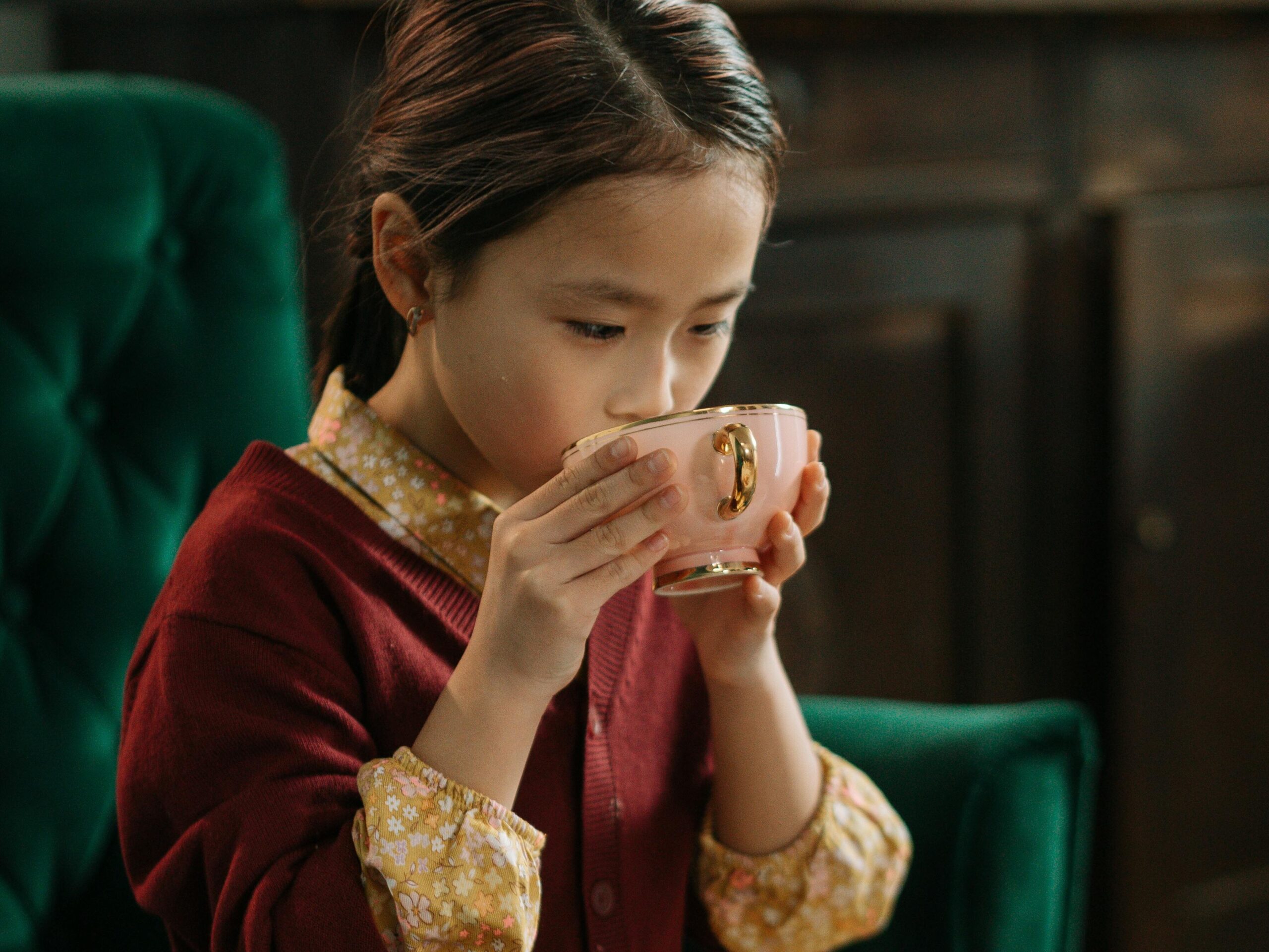
Green tea tasting involves noting specific flavor profiles that reveal quality and origin. Matcha displays bright, vegetal notes with slight bitterness balanced by sweetness and umami depth.
Your tasting vocabulary will grow as you sample more varieties and pay attention to mouthfeel, aroma, and aftertaste. Many tea enthusiasts keep tasting journals to track their preferences and detect subtle differences between harvests.
Professional evaluation looks at leaf appearance, liquor color, and flavor complexity. Water temperature matters greatly—too hot water can ruin matcha’s delicate taste profile. The best teas show harmony between astringency and sweetness while maintaining distinct regional characteristics.
Chinese Dragon Well tea offers chestnut notes, while Japanese sencha presents grassy, oceanic qualities that reflect their growing regions and processing methods.
Tea quality assessment also considers finish length—how long flavors linger after swallowing. Premium green teas often produce multiple excellent infusions, with each steep revealing new flavor dimensions.
The brewing process itself becomes an essential part of understanding optimal extraction techniques for each tea type. Next, we’ll explore the specialized equipment and precise methods needed for perfect green tea preparation.
Understanding Grades and Labels

Tea grades and labels tell you a lot about quality and help you make smart choices. For matcha, three main grades exist: Ceremonial, Daily, and Culinary. Ceremonial Grade sits at the top tier, crafted specifically for traditional tea ceremonies in Japan.
This premium matcha offers vibrant green color, smooth texture, and rich umami flavor without bitterness. Daily Grade provides good quality for regular drinking at a more affordable price point.
Culinary Grade works best in recipes, lattes, and baking due to its stronger flavor that stands up to other ingredients.
Labels on green tea packages contain vital clues about origin, harvest time, and processing methods. Japanese teas often display terms like “shincha” (first harvest) or regional names like “Uji” or “Shizuoka” that signal specific flavor profiles.
Chinese tea labels might showcase “Longjing” (Dragon Well) or “Huang Shan Mao Feng” to indicate classic styles with established quality standards. The harvest date matters greatly—fresher green teas typically deliver better taste experiences, as these leaves lose flavor faster than other tea types.
Pay attention to organic certifications if you value farming practices that avoid synthetic pesticides.
Optimal Storage Practices
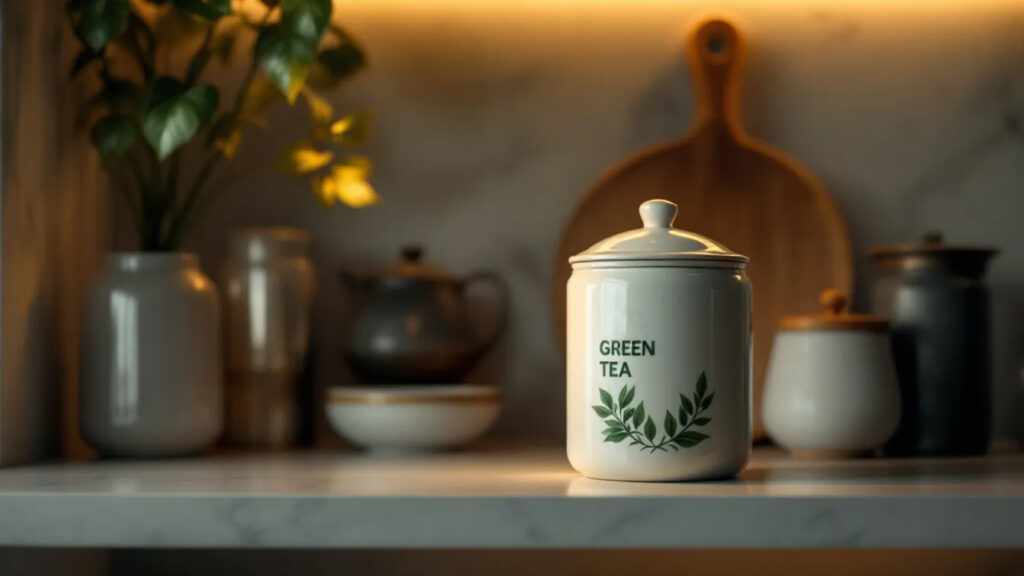
Green tea requires proper storage to maintain its delicate flavors and health benefits. Correct storage prevents quality loss and extends shelf life for all varieties including matcha.
- Store green tea in airtight containers to prevent moisture absorption which can lead to mold growth and flavor deterioration.
- Keep tea away from direct sunlight as UV rays break down the compounds that give green tea its color and health properties.
- Place your tea in a cool location since heat speeds up oxidation and causes flavor to fade faster.
- Avoid strong odors near your tea storage area because tea leaves easily absorb surrounding scents.
- Maintain a dry environment for your tea since humidity can cause clumping in matcha powder and staleness in leaf teas.
- Use opaque containers for matcha powder specifically to block light that degrades its vibrant green color and antioxidants.
- Consider refrigeration for matcha and high-grade green teas if you live in a warm climate, but seal packages tightly to prevent condensation.
- Separate green tea from spices and coffee to prevent flavor contamination through absorption.
- Buy appropriate amounts that you can use within 6 months for optimal freshness rather than storing large quantities long-term.
- Label storage containers with purchase dates to track freshness and ensure you use older teas first.
- Transfer store-bought tea from paper packaging to proper storage containers immediately after opening to preserve quality.
- Check tea periodically for signs of staleness or moisture damage to maintain the best drinking experience.
ComSaf Airtight Glass Jar 34oz Set of 3
Genuinely airtight seal for tea freshness—just store in a dark cabinet since the glass is clear.
Green tea's delicate compounds degrade quickly when exposed to light, heat, moisture, or air. These airtight glass jars protect against three of those four enemies—the strong seal (15 reviewers confirmed) keeps contents fresh, and the thick glass resists breakage. Store them in a dark cabinet to handle the light-protection piece.
⚠️ Skip this if you keep tea on a sunny counter—clear glass doesn't block UV, so you'll need cabinet storage or a dark pantry.
Advanced Brewing Techniques
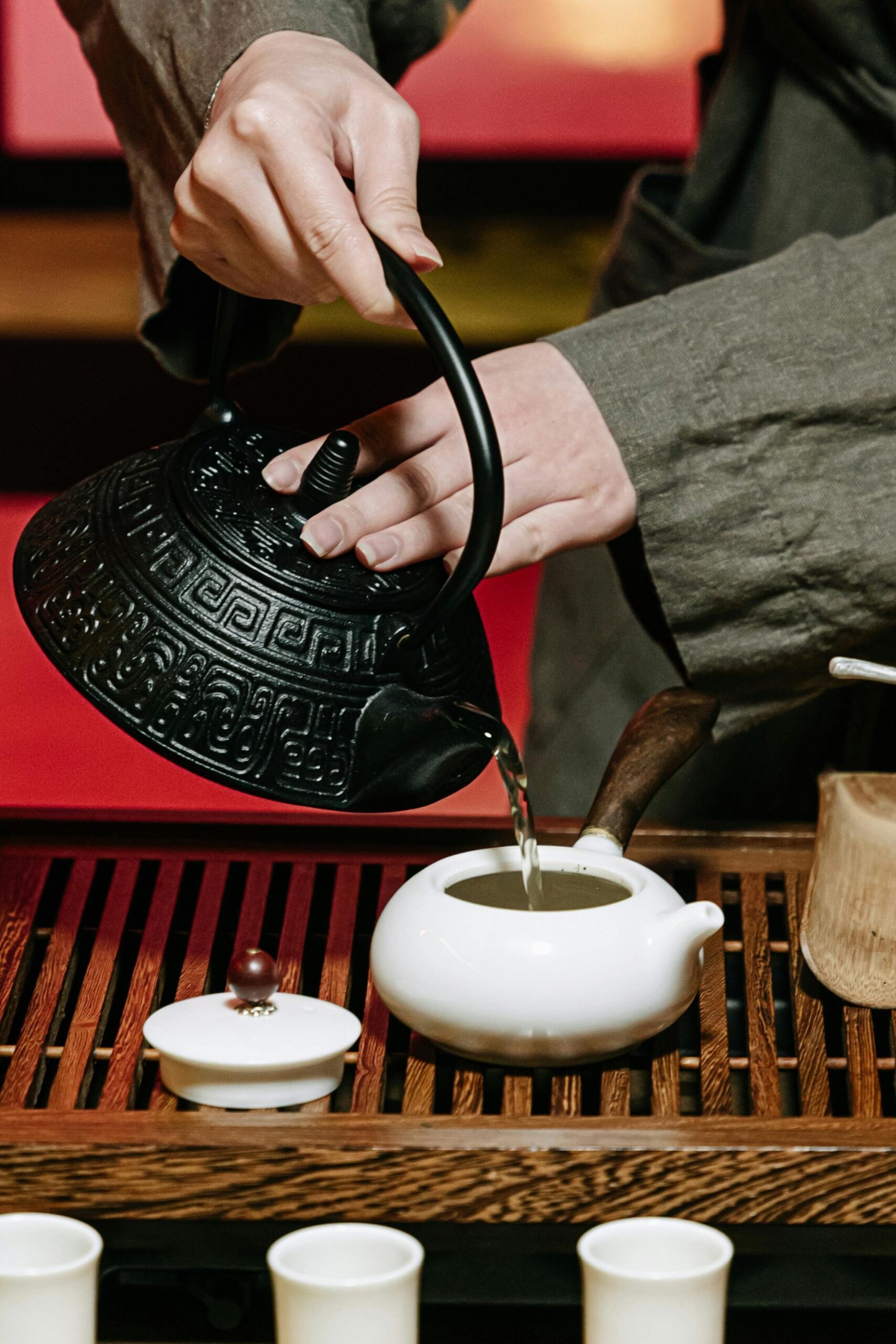
Master the art of green tea brewing with precise temperatures, special tools, and water quality tricks that bring out hidden flavors in each variety – discover these expert methods to transform your daily cup from good to exceptional.
Temperature and Time Control Precision
Green tea demands exact temperature control for the best flavor. Most green teas taste bitter when brewed with boiling water. Japanese varieties like sencha need cooler water (160°F-170°F), while Chinese types such as Dragon Well can handle slightly warmer temperatures (170°F-180°F).
Matcha requires specific heat between 150°F to 170°F to bring out its sweet notes without releasing too much bitterness.
Timing matters just as much as temperature in green tea brewing. Delicate Japanese teas often need only 1-2 minutes of steeping time. Chinese green teas may require 2-3 minutes to develop full flavor.
Too long, and your tea becomes astringent; too short, and you miss the tea’s complete taste profile. A simple kitchen timer helps track these short intervals with precision. Many tea experts use digital thermometers to check water temperature before pouring it over tea leaves.
Tea-Specific Brewing Parameters
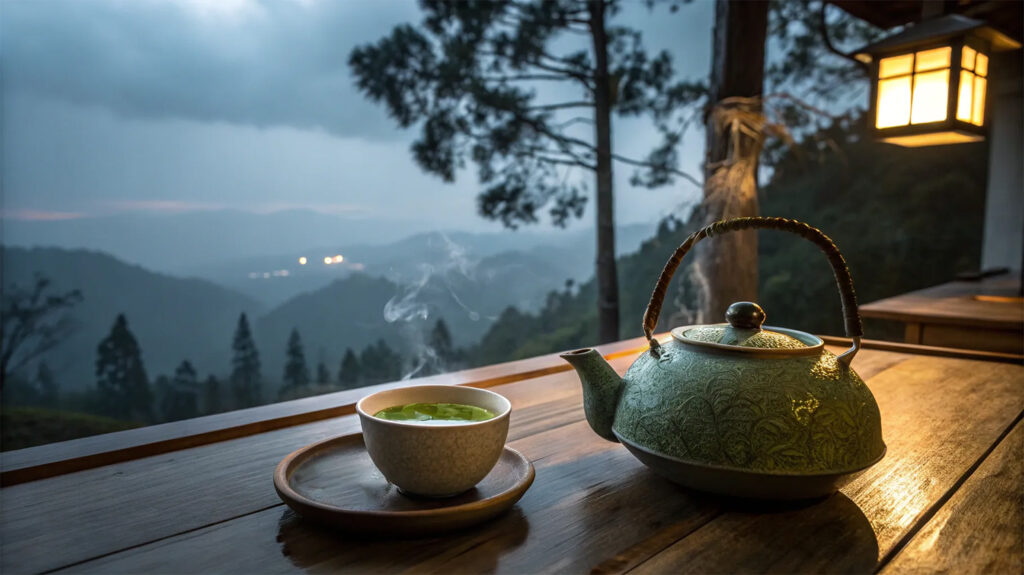
Beyond temperature control, each green tea type demands its own brewing approach. Sencha tastes best with water at 175°F for 1-2 minutes, while delicate gyokuro requires cooler water around 140°F with a longer steep time of 2-3 minutes.
Matcha powder needs whisking in water at 175°F until frothy. Dragon Well tea shines at 180°F with a quick 1-minute infusion to capture its chestnut notes without bitterness.
Tea quality affects these parameters significantly. Higher-grade teas often need lower temperatures to preserve their subtle flavors. The leaf-to-water ratio matters too—generally 1 teaspoon per 8 ounces works for most green teas, but shade-grown varieties like matcha use less.
For optimal polyphenol extraction, you might brew at 212°F (100°C) for a full 10 minutes, though this creates a bitter cup that many find unpleasant.
Regional traditions influence brewing methods as well. Japanese tea ceremonies use specific tools and precise movements to prepare matcha. Chinese gongfu brewing employs small pots with higher leaf ratios.
These cultural approaches highlight different aspects of the tea experience. Experimenting with these parameters helps you discover your perfect cup while respecting the unique character of each tea variety.
Equipment and Water Quality Considerations
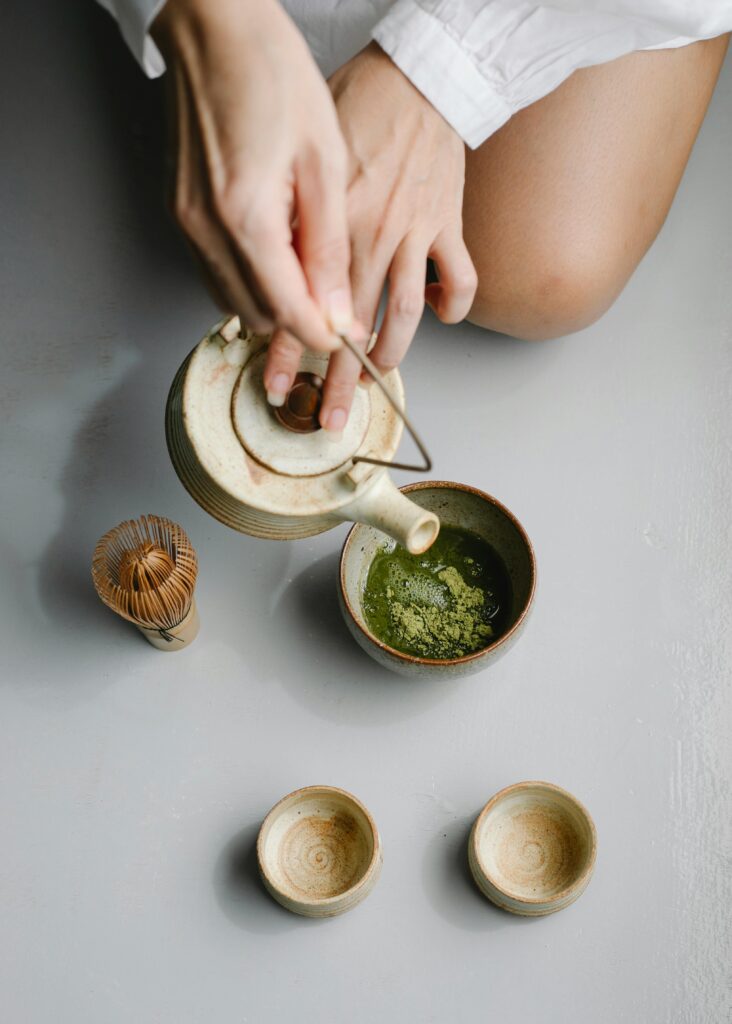
Tea-specific brewing methods require proper tools for the best results. For matcha preparation, you’ll need three essential items: a chawan (bowl), chashaku (bamboo spoon), and chasen (bamboo whisk).
These traditional tools help create the perfect frothy texture that makes matcha special. Water quality matters just as much as your brewing gear. Tap water often contains minerals that can alter tea flavor, so many tea experts suggest using filtered water for cleaner taste profiles.
Water temperature plays a crucial role in green tea preparation. The ideal range sits between 150°F and 170°F for most varieties. Boiling water will scorch delicate green tea leaves, creating bitter flavors instead of the sweet, grassy notes you want.
A simple digital thermometer helps achieve the right temperature consistently. Glass or ceramic teapots work best for green teas because they don’t retain flavors from previous brews and allow you to watch the leaves unfurl.
Multiple Infusion Techniques
Green tea leaves can yield multiple flavorful brews from a single portion. Most quality green teas, especially gyokuro and Dragon Well, release different flavor profiles with each steep.
Start with a short first infusion of 30-45 seconds, then add 15-30 seconds for each subsequent brew. Japanese teas often produce 2-3 good infusions, while Chinese varieties might yield 4-5 steeps before losing strength.
Each infusion brings out unique aspects of the tea’s character. The first steep typically reveals bright, grassy notes with higher caffeine content. Later infusions develop deeper, sweeter flavors with more subtle complexity.
This practice maximizes value from premium teas and lets you explore the full range of flavors hidden in the leaves. Many tea enthusiasts adjust water temperature slightly higher for later infusions to extract remaining compounds.
COSORI Electric Gooseneck Kettle with Temperature Control
Labeled presets for green tea's ideal temperature range—precision brewing without a learning curve.
Green tea brewing lives and dies by temperature—too hot and you get bitter astringency, too cool and flavors stay locked in the leaf. This COSORI kettle's 5 temperature presets eliminate the guesswork, with specific settings for green tea's 160-175°F sweet spot. Eighteen reviewers praised the precision, and the hour-long temperature hold supports multiple infusions.
⚠️ Skip this if you're brewing for a family or group—0.8L capacity makes about 3 cups, so you'll be refilling and reheating for larger gatherings.
Evidence-Based Health Benefits
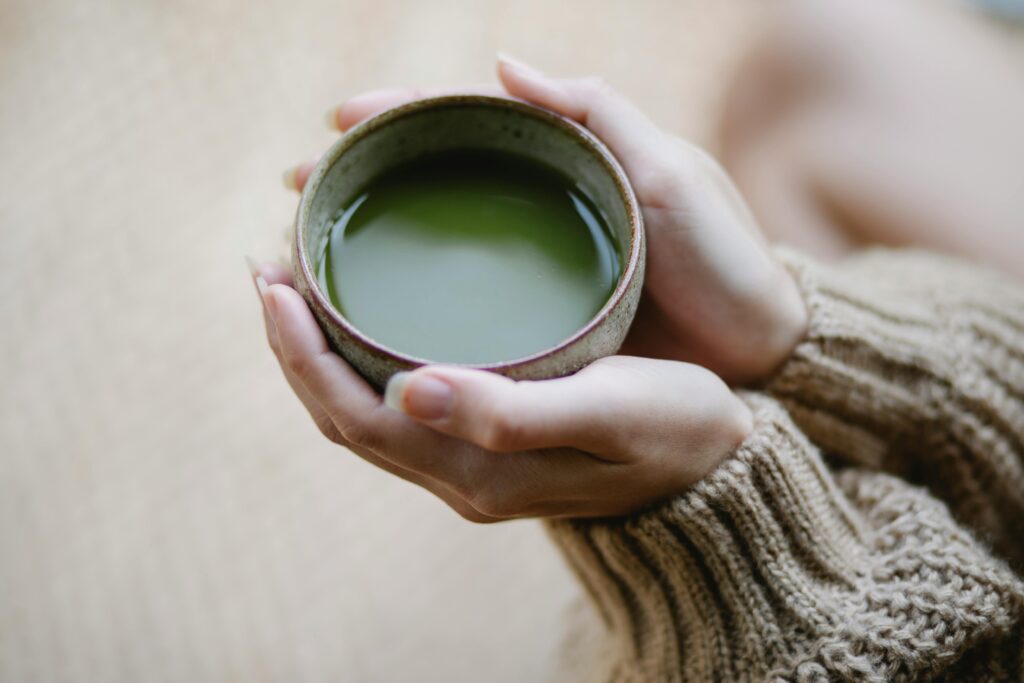
Green tea contains powerful compounds that fight cell damage and reduce heart disease risk. Studies show that regular green tea drinkers have lower cholesterol levels and better blood sugar control than non-tea drinkers.
Green Tea Compounds and Quality Considerations
Tea quality directly impacts the health benefits you receive. High-grade green teas contain more catechins, powerful antioxidants that fight cell damage. These compounds vary greatly between tea types.
Matcha delivers significantly more antioxidants per serving than steeped green tea because you consume the entire leaf rather than just an infusion—providing up to 10 times the antioxidant intake from the same amount of tea leaves.
The growing region, harvest time, and processing methods all affect these beneficial elements. Fresh, properly stored tea preserves these compounds better than old or poorly kept varieties.
L-theanine stands out as another key compound in quality green tea. This amino acid promotes both relaxation and mental alertness – a unique combination that explains why many tea drinkers report feeling calm yet focused.
Premium shade-grown teas like gyokuro and matcha have higher L-theanine levels due to their growing methods. The caffeine content works together with L-theanine to create this balanced effect without the jitters often associated with coffee consumption.
Tea storage plays a vital role in maintaining these health-boosting compounds. Exposure to air, light, moisture, and strong odors degrades catechins and other beneficial elements. The best storage containers keep tea away from these harmful factors.
Glass jars with tight seals work well for short-term storage, while metal tins offer better protection for longer periods. Proper storage helps maintain both flavor and the medicinal properties that make green tea such a valuable addition to your daily routine.
Beverage vs. Extract Benefits
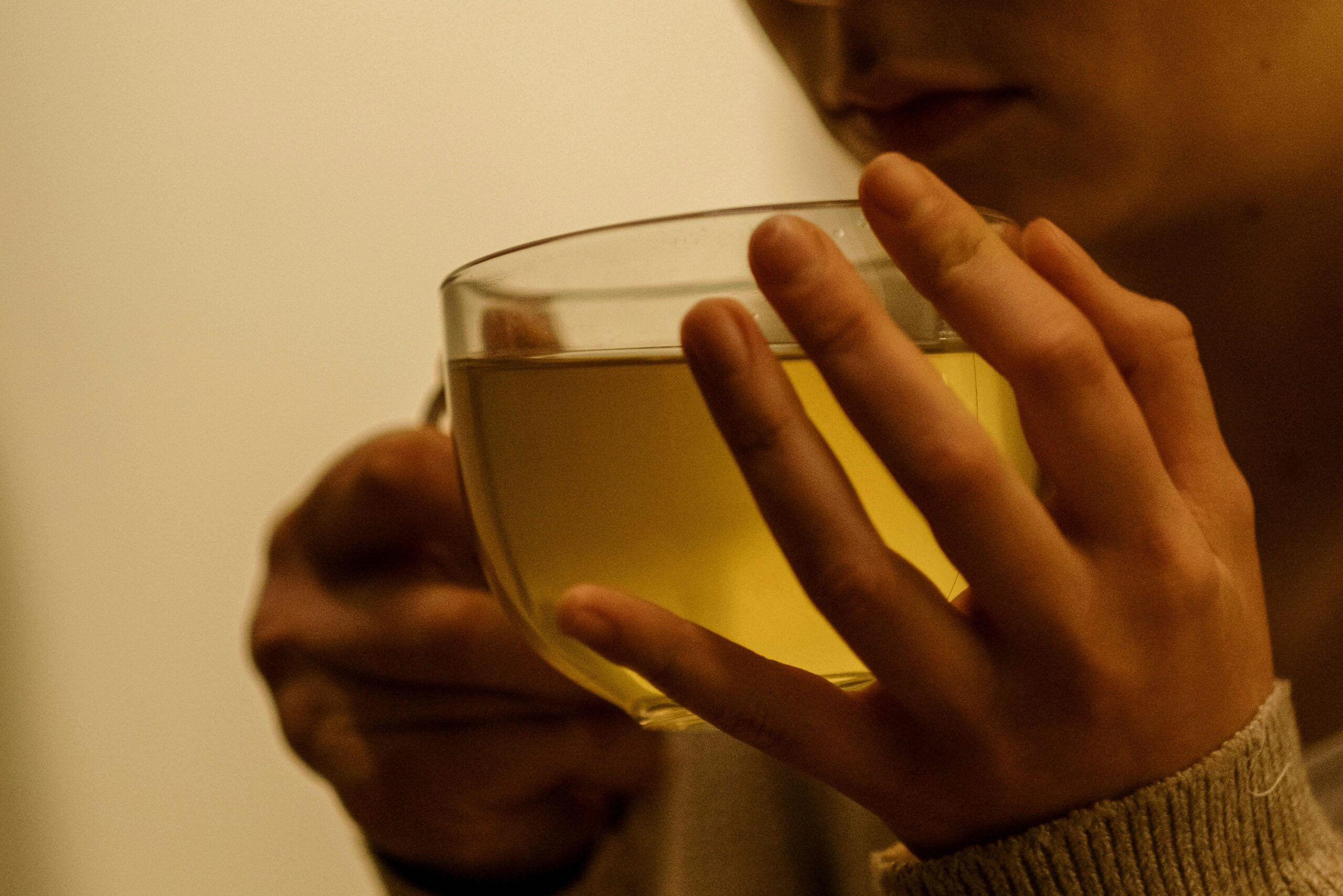
Green tea consumption comes in different forms, each with unique health implications. Let’s examine how drinking green tea compares to taking concentrated extracts in terms of health benefits.
| Comparison Factor | Green Tea Beverage | Green Tea Extract |
|---|---|---|
| Catechin Content | Contains 30-130 mg per cup, varies by brewing method and tea quality | Concentrated, may contain 100-500 mg per dose |
| Bioavailability | Lower but more natural absorption rate | Higher concentration but may not be fully absorbed |
| Antioxidant Effects | Moderate, builds up with regular consumption | More immediate, potentially stronger effects |
| Weight Management | Modest effect through multiple mechanisms including hydration | Studies show slightly enhanced metabolic effects at higher doses |
| Cardiovascular Benefits | Gradual improvements with daily consumption (2-3 cups) | More pronounced cholesterol reduction in some studies |
| Safety Profile | Very safe, minimal risk of side effects | Potential liver issues at high doses, especially on empty stomach |
| Ritual & Mindfulness | Includes calming preparation and drinking ritual | Missing psychological benefits of tea ritual |
| Hydration | Contributes to daily fluid intake | No hydration benefit |
| Additional Compounds | Contains L-theanine, beneficial minerals, and varied polyphenols | Often focused on EGCG, may lack synergistic compounds |
| Cost Effectiveness | More economical for long-term consumption | Higher cost per dose of active compounds |
Research suggests that whole tea provides balanced benefits through compound synergy, while extracts offer targeted, stronger effects. Next, we’ll explore the scientific evidence behind specific health properties associated with regular green tea consumption.
Research-Backed Health Properties
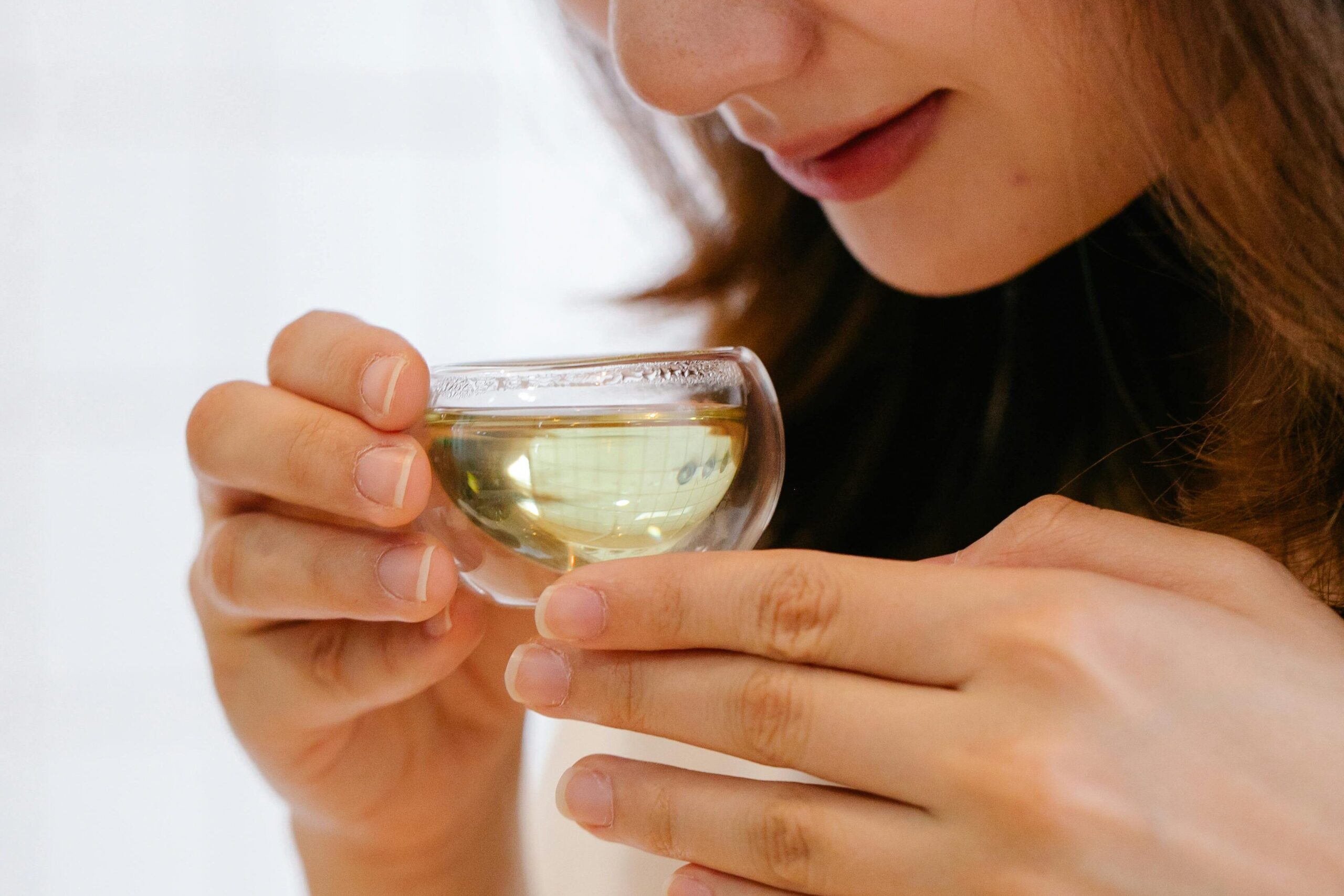
Green tea offers several proven health advantages backed by scientific research. Studies show that its main catechin, EGCG, fights tumor growth while protecting healthy cells. This powerful compound works through multiple pathways to reduce oxidative stress in the body.
The unique combination of caffeine and theanine in green tea enhances attention and mental focus without the jittery effects of coffee.
Matcha stands out as particularly beneficial for brain health. Research indicates it may boost learning abilities and cut down brain inflammation by increasing BDNF (Brain-Derived Neurotrophic Factor).
This protein helps brain cells grow and survive longer. Regular tea drinkers often show lower risks of cardiovascular disease, type 2 diabetes, and certain cancers compared to non-drinkers.
These benefits appear strongest in people who drink 2-3 cups daily over several years.
The Culture of Green Tea
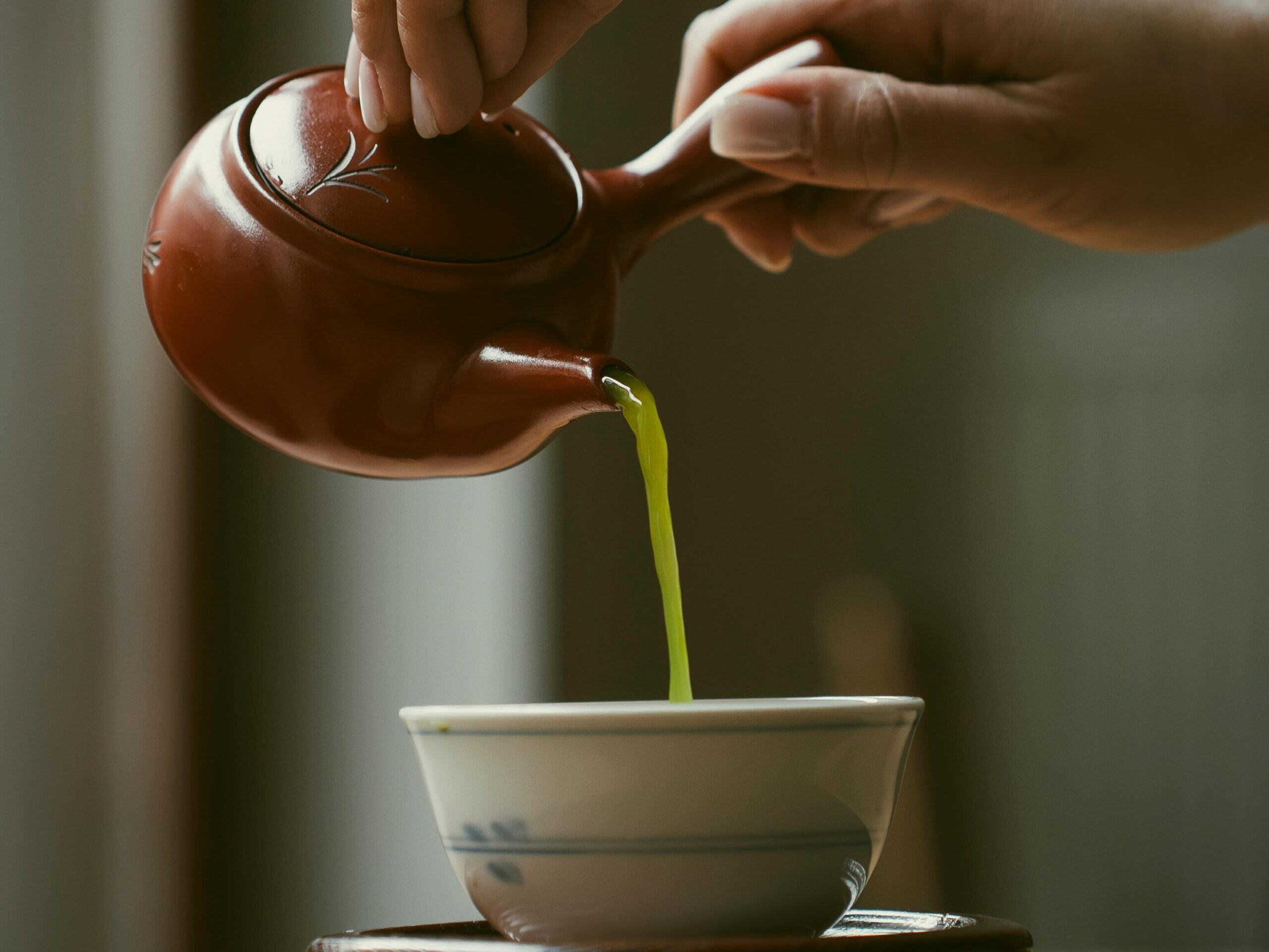
Green tea lives at the center of rich traditions across Asia, from the precise steps of Japanese tea ceremonies to the casual daily rituals in Chinese homes. Tea connects people through shared customs that span centuries, creating bonds across generations and borders.
Discover how this humble leaf shapes art, literature, and daily life in our full guide to green tea culture.
Historical Significance and Modern Practice
Tea culture traces back to ancient times, with Chinese legend telling of Emperor Shennong’s discovery of tea in 2737 BCE. According to this traditional story, the mythical ruler found tea when leaves blew into his boiling water, creating an aromatic drink that would become treasured throughout Chinese society.
While the exact origins remain unknown, archaeological evidence confirms tea drinking in China dates back thousands of years.
Buddhist monks later carried these precious leaves to Japan in the early 9th century, where distinct preparation methods evolved into formal ceremonies that still exist today. Green tea spread westward through trade routes, finally reaching European shores via Dutch and Portuguese merchants in the 17th century.
Modern tea practices blend traditional respect with everyday convenience. Many Japanese homes maintain tea rooms for formal gatherings while also enjoying quick cups during busy workdays.
Chinese tea houses still serve as social hubs where people discuss business or meet friends over steaming cups of Dragon Well or Bi Luo Chun. Western cultures have embraced matcha lattes, bottled tea drinks, and specialty tea shops that make this ancient beverage accessible to new generations.
The balance between ritual and utility shows how green tea adapts to changing lifestyles while maintaining its cultural importance.
Japanese Tea Ceremony
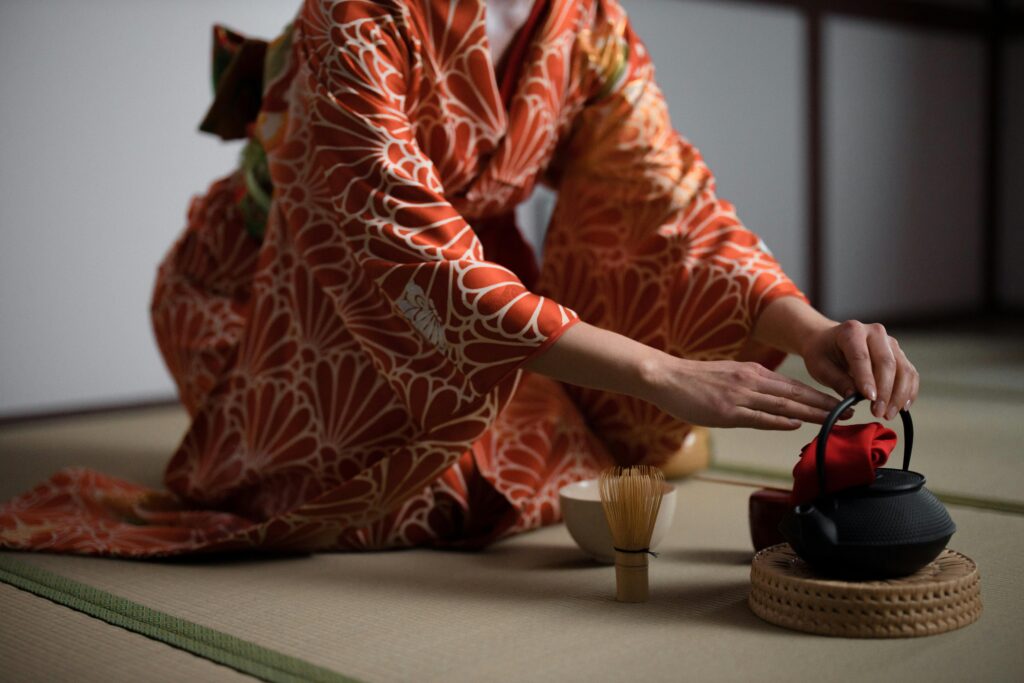
From historical practices to modern rituals, the Japanese Tea Ceremony stands as a profound cultural tradition. This meditative ritual focuses on the careful preparation, serving, and drinking of matcha green tea.
The ceremony transforms a simple act into an art form that honors mindfulness and respect between host and guests.
Each movement in the tea ceremony carries meaning, from how the bowl is turned to the way matcha powder is whisked. Special tools like the chasen (bamboo whisk) and chawan (tea bowl) play key roles in this ritual.
Many tea enthusiasts travel to Japan to experience authentic ceremonies, where silence and appreciation create a peaceful break from daily stress.
Chinese Tea Traditions
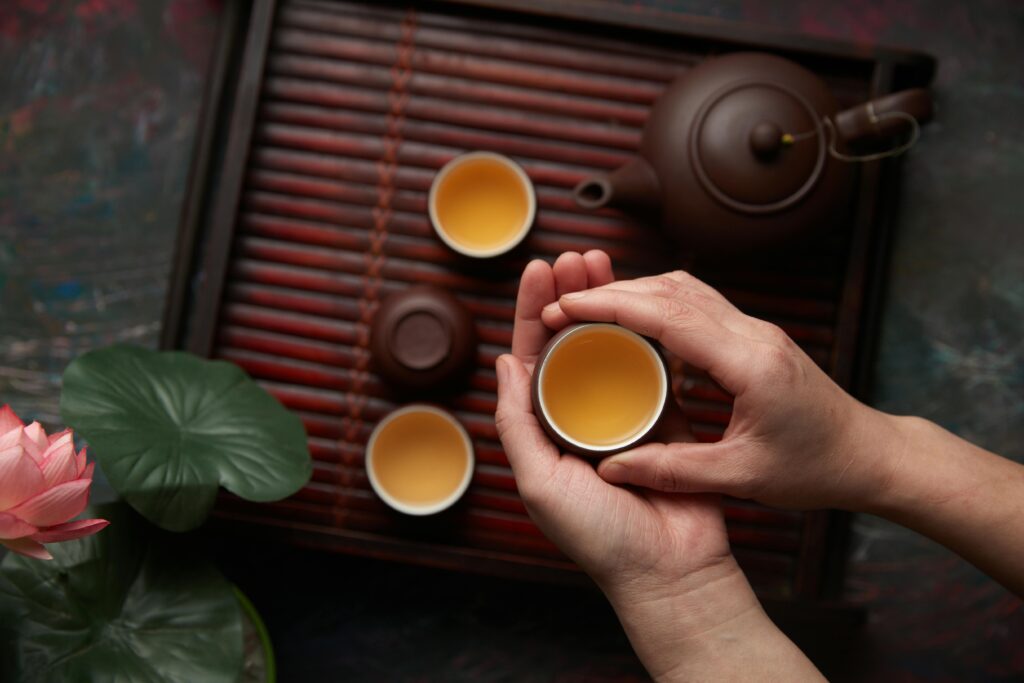
Chinese tea traditions stretch back thousands of years, forming the backbone of social customs and daily life. Tea houses serve as community centers where people gather to sip tea, play games, and discuss important matters.
The Chinese tea ceremony, known as Gongfu Cha, focuses on bringing out the best flavors through precise brewing methods. Each step matters – from warming the cups to the exact water temperature and steeping time.
Chinese green tea stands out for its remarkable flavor profile and health benefits that have made it famous worldwide. The Classic of Tea, written by Lu Yu during the Tang Dynasty, remains the first complete work about tea culture.
Many regions in China produce distinct green tea varieties, each with unique processing methods that create different tastes. Dragon Well (Long Jing) tea from Hangzhou ranks among the most prized types, known for its flat shape and sweet, nutty flavor that tea lovers seek out.
Korean Tea Rituals
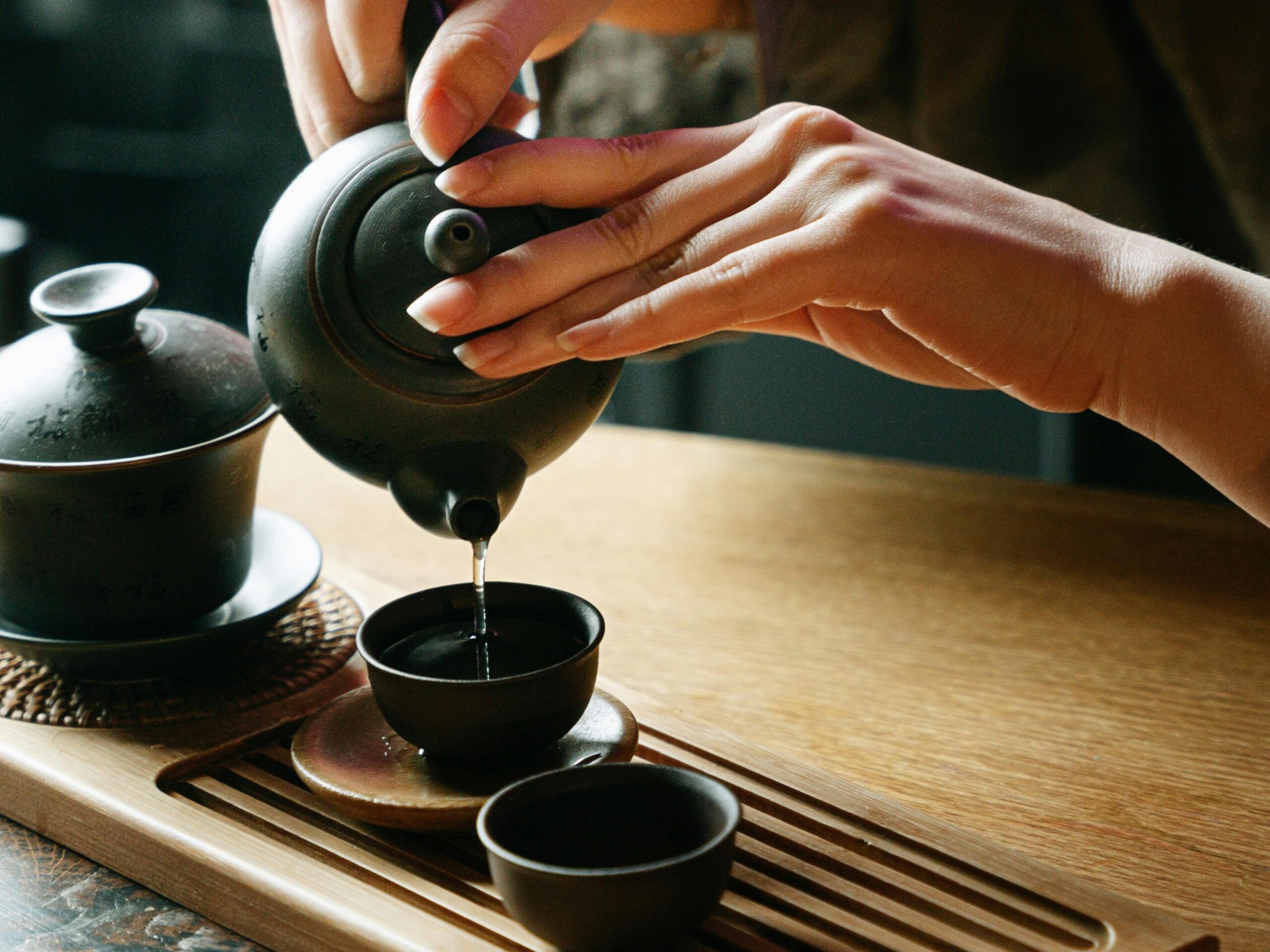
Korean tea rituals focus on simplicity and mindfulness, creating a peaceful experience for participants. The traditional “Dado” method involves specific steps that bring out the best flavors from tea leaves.
Unlike more complex ceremonies, Korean tea practices emphasize a direct connection with nature and the present moment.
Tea masters in Korea pay close attention to water temperature, brewing time, and proper serving techniques. Each cup serves as a moment for reflection rather than mere consumption.
The ritual often takes place in simple settings with minimal decoration, allowing the tea itself to become the center of attention. Many Korean green teas, particularly those made from early spring harvests, feature prominently in these ceremonies.
Guests at Korean tea gatherings learn to appreciate subtle flavors and aromas through mindful sipping. The practice dates back centuries but remains relevant in modern Korean culture as an antidote to busy lifestyles.
Small cups encourage participants to drink slowly and savor each sip fully. This mindful approach to tea drinking represents an important cultural tradition that continues to influence Korean attitudes toward refreshment and hospitality.
Conclusion
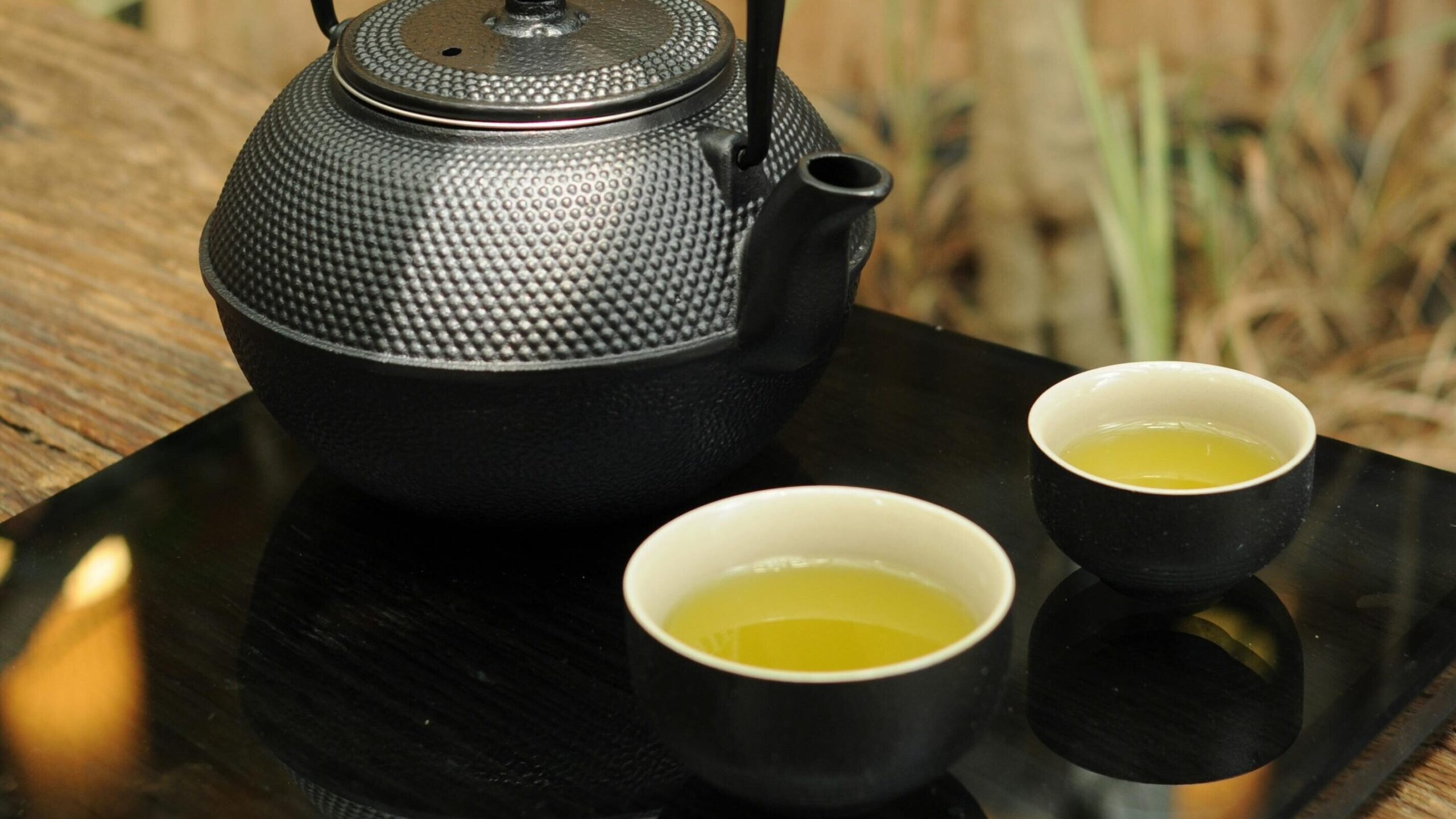
Green tea offers a world of flavors and health benefits worth exploring. From Japanese matcha to Chinese Dragon Well, each variety brings unique tastes and properties to your cup. The rich traditions behind these teas span thousands of years, connecting modern drinkers to ancient wisdom and practices.
Your journey through green tea types can lead to both better health and deeper cultural appreciation. Start small with a few basic varieties, then expand your tea horizons as your palate develops.
Explore the elegant complexity of another beloved tea variety with our guide to Oolong Tea Types.
FAQs
1. What are the main types of green tea?
The main types of green tea include sencha, matcha, gyokuro, and genmaicha. Sencha is the most popular Japanese green tea with a grassy taste. Matcha is a powdered tea used in ceremonies, while gyokuro is a premium shade-grown variety. Genmaicha combines green tea with roasted rice for a nutty flavor.
2. How is green tea different from other teas like oolong or white tea?
Green tea undergoes minimal oxidation process compared to oolong tea which is partially oxidized. White tea is even less processed than green tea, using only young leaves and buds. The limited oxidation gives green tea its distinctive color and higher phenolic content that contributes to its health benefits.
3. What health benefits does drinking green tea offer?
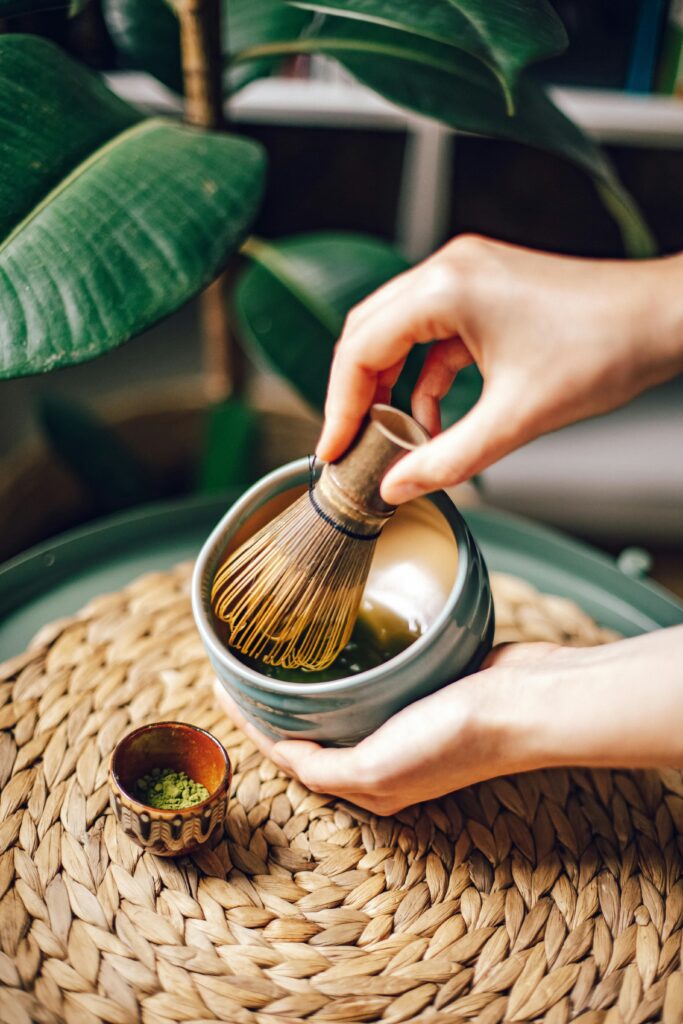
Green tea may support weight loss by boosting metabolism. It contains antioxidants that help your circulatory system and can lower bad cholesterol (LDL). Many people also drink it to reduce stress and improve sleep quality.
4. How much caffeine is in green tea?
One cup of green tea typically contains 25-45 mg of caffeine, which is less than coffee but more than herbal tea. The caffeine content varies among different types of green tea, with matcha having higher levels since you consume the actual tea leaves.
5. What’s special about matcha tea?
Matcha is a powdered green tea where you consume the entire leaf, not just tea-infused water. This provides more nutrients and a stronger flavor than other varieties. It’s traditionally used in Japanese tea ceremonies and has become popular worldwide for its vibrant green color and health properties.
6. Can I add flavors to green tea?
Yes! Moroccan mint tea combines green tea with fresh mint leaves for a refreshing drink. Many varieties of flavored green teas exist, including those mixed with jasmine flowers or fruit essences. You can explore different combinations to find one that suits your taste preferences.
References
- https://senchateabar.com/blogs/blog/green-tea?srsltid=AfmBOorRTO8A1I3Nd5DsyQT704k9Os9jk04YmkMmEdqCIGTbam1FixC3
- https://senchateabar.com/blogs/blog/green-tea?srsltid=AfmBOorNowMwkZma8vrkegpFvVc3lFqtadR9DRFcitNfwft2SlcD3B4O
- https://senchateabar.com/blogs/blog/green-tea?srsltid=AfmBOop564kt0mBczud8NLy5abb1DqtWDiDjteKDyGSz6c6Ij8qQexDi
- https://blog.fusionteas.com/what-is-the-difference-between-pan-fired-and-steamed-green-teas/
- https://www.artoftea.com/blogs/tea-profiles/matcha-green-tea-the-ultimate-guide
- https://artfultea.com/blogs/tea-wisdom/japanese-tea?srsltid=AfmBOoq8fmrEI-Xyyj-qkS31SFvKXIzEtJ6aaFA1UvUUMJqo3ubrH74o
- https://www.mdpi.com/2304-8158/14/5/745
- https://www.borntea.com/blogs/tea/complete-guide-to-green-tea?srsltid=AfmBOooyIHA_qoXNHYpXPkyvE5fr2NZK5x5UYU6ZoovZHd_R79gVfmQU
- https://www.borntea.com/blogs/tea/complete-guide-to-green-tea?srsltid=AfmBOooagug1Hn7Gn3ceESzTq309E7T6jtoOQl021mItKePVOerdQdjH
- https://senchateabar.com/blogs/blog/green-tea?srsltid=AfmBOorFyhCiuaP6rxa5DOdoRfPLhyPY0LR0g9KN2zuKq9sg0oYPzcuK
- https://matcha.com/blogs/news/matcha-green-tea-complete-guide-to-getting-started-and-beyond-2020
- https://senchateabar.com/blogs/blog/green-tea?srsltid=AfmBOorLTvvmkqsvXV88Ej3WRPDuCKep1RfTiXRFbT6zBloYV–jETd_
- https://www.byfood.com/blog/culture/ultimate-guide-to-gyokuro-tea (2023-10-12)
- https://www.japanesegreenteain.com/blogs/green-tea-and-health/everything-you-need-to-know-about-different-types-of-japanese-green-tea (2023-08-31)
- https://senbirdtea.com/blogs/tea-culture/ultimate-guide-to-japanese-green-tea?srsltid=AfmBOor6-KVPM2RrFMbqD7iUXAAANsqznOSCG3qQLA3bYOIOKBlxAYY4 (2021-08-19)
- https://www.sugimotousa.com/blog/what-are-the-harvest-seasons-of-japanese-teas-and-how-do-they-affect-quality?srsltid=AfmBOoo5LdVEXhs0mnGpI3hukFXwn8oNiLMoSLdsAiv2dL_R5ZDs6iwa
- https://artfultea.com/blogs/tea-wisdom/what-is-dragon-well-tea?srsltid=AfmBOooPt1gDJ-n-w7D1m-m7yJArRRKM5-BvHVlXk0GEKlvOXARhCsaB
- https://pressbooks.cuny.edu/chinesefarmerteas/chapter/the-ultimate-guide-to-chinese-green-tea-types-benefits-and-how-to-enjoy-it/
- https://i-tea.club/en/articles-about-tea/bi-lo-chun-en?srsltid=AfmBOoo5K-3_B-eOVquZwo8x0MC43QDhrx7d6AuME3XnbMEmGBiSwd5p (2018-03-18)
- https://www.teasenz.com/liu-an-gua-pian-green-tea?srsltid=AfmBOoqNFBUbvfHqR16PQ5HHCmS8lImaX9XIsUQAvlr4rcios28MTpIz
- https://weaverscoffee.com/blogs/blog/the-ultimate-guide-to-green-tea?srsltid=AfmBOorDKB-K8y_s6K-1JKrZo0wPcNxhaHg9XGceGTEnpExtKrgVsUme (2024-06-22)
- https://www.shizuokatea.com/blog/what-is-matcha/
- https://japanesetea.sg/japanese-tea-pedia/kukicha-and-karigane/?srsltid=AfmBOopXr8Z2EsZK3f1vnpH07n9NIjyb3v5hu5xvJbyxTTHxzpDblAF3
- https://artfultea.com/blogs/tea-wisdom/japanese-tea?srsltid=AfmBOoqbqHkV-BlChJdAXVJYLxOdxf4echDYP7wASpKpnascRXtZAbEP
- https://artfultea.com/blogs/tea-wisdom/japanese-tea?srsltid=AfmBOorOMpiKkAHHUhRLUo-2OBXtQNSuPornWXRzLZIG4_x1fpye4i_5
- https://senbirdtea.com/blogs/health/5-health-benefits-of-genmaicha-brown-rice-green-tea
- https://www.arborteas.com/organic-korea-sejak-green-tea.html?srsltid=AfmBOoqofipoVm3KkfFVBNbP3l1OmWMvS4BVezqMwa-GuC5TT395VoMF
- https://teajtea.com/blogs/tea-region/unveiling-the-wonders-of-vietnamese-green-tea-a-comprehensive-guide?srsltid=AfmBOoprJ2UAySn4YoDnhznoq_0jfRUA4tmAtO5JLdqIQbMSFkqf-RlQ
- https://munchingwithmariyah.com/the-ultimate-guide-to-matcha/
- https://jyyna.co.uk/green-tea-guide/
- https://pmc.ncbi.nlm.nih.gov/articles/PMC9792400/
- https://blackatlantic.uga.edu/how-to-choose-green-tea-expert-guide
- https://artfultea.com/blogs/tea-wisdom/what-does-matcha-taste-like?srsltid=AfmBOopUNBmr2_1e2hSTxCDNF6yhXZQgaZ39NvQCyODEhaAcHTZcHyFJ
- https://matcha.com/blogs/news/a-guide-to-different-matcha-grades-and-categories
- https://www.tightvac.com/blogs/blog/storing-matcha?srsltid=AfmBOooG0L8gN7UceIw8fFJjucAk0uM_QVYkxN5v109ZKO1YHf3mUg3A
- https://senchateabar.com/blogs/blog/matcha-green-tea?srsltid=AfmBOopPiw2tcgZd18LwDcgWUrlTyeiauDSLdAkuDmTCjq5QiCknw5nS
- https://pmc.ncbi.nlm.nih.gov/articles/PMC8400668/
- https://senchateabar.com/blogs/blog/matcha-green-tea?srsltid=AfmBOopOCEvCbISYtdNhxeXiWI4EyiVA6E6rOMNdEbBMV9KCOQ67b8b9
- https://senchateabar.com/blogs/blog/matcha-green-tea?srsltid=AfmBOor_gn5sI41_97K1Q3V1MvPxFa-u0SqVnrKBHiqfThp9XblI6WOY
- https://www.chalait.com/blogs/matcha-guide/green-tea-vs-matcha?srsltid=AfmBOorfPmC9R5jNM8JhLfbBDrphTprw74XVlabGzJ7mZAQ5bfg-J8vk
- https://matcha.com/pages/matcha-health-benefits
- https://www.medicalnewstoday.com/articles/matcha-vs-green-tea (2021-04-28)
- https://weaverscoffee.com/blogs/blog/the-ultimate-guide-to-green-tea?srsltid=AfmBOoqp4baP6bQIi4Dm7Au0F2qorBnEVV9bcwg-45Oph9Thz9h38G_8
- https://senbirdtea.com/blogs/tea-culture/ultimate-guide-to-japanese-green-tea?srsltid=AfmBOooKhChpCtwD7a9hMkqU9GWQ_QqANKToqYVzOGzbcOctFijIML_b (2021-08-19)
- https://kimcmarket.com/blogs/korean-food-blog/sip-savor-and-explore-korean-tea-and-its-cultural-significance?srsltid=AfmBOoooBbgrHnLtycn8whBtTdoetSA5xw9AQgpFy1yyFAD6jhiU4eU-

